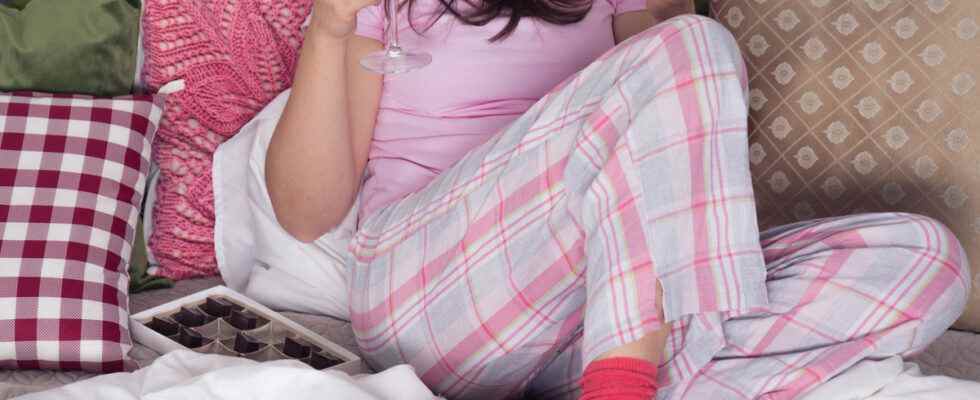After a crummy night of sleep, most people play the blame game, pointing fingers at work stress, the blue light from their devices, or their bedmates tossing, turning, or wagging. But there’s another common disruptor of Zzz’s most sleep-deprived folks don’t think of: their dinner or late-night snack.
As it turns out, what you choose to snack on before bedtime can play a big role in how well you hit the hay.
“Some foods are downright energizing, and others can aggravate conditions like heartburn, indigestion, and acid reflux,” explains Lisa Richards CNC, nutritionist and founder of The Candida Diet. Eating these foods around bedtime will make falling (and staying!) asleep difficult, she says. If you can’t sleep and can’t figure out why, cutting out sneaky foods that ruin a restorative night’s rest can help.
Good news: Not all foods ruin your chances of shut-eye. Some nocturnal noshes actually double as sleep aids, according to Richards. Certain foods can help you sleep—they have a calming, sleep-inducing effect on the body that makes falling asleep easier, she says.
Of course, avoiding some eats and chowing down others can’t cure insomnia or quiet a teething baby. Still, adjusting your food intake before bed can’t hurt. Scroll down for a list of 20 that may help you ease into dreamland—and 20 foods that’ll ruin good sleep faster than you can say “heartburn.”
First… The Best
Tarragon
A popular garnish on meats and fishes (especially in France!), tarragon is as medicinal as it is flavorful. “Tarragon has been used as a remedy for poor sleep quality,” explains integrative health practitioner Kristin Grayce McGary LAc., MAc., author of Holistic Keto for Gut Health: A Program for Resetting your Metabolism. The spring herb also has antioxidant properties, supports digestion, and is a good source of potassium, she says.
Your move: purchase either fresh tarragon (which FYI can last in the fridge about 4 days) or dried tarragon. Then, either make this Whole30 Butternut Squash, Fennel, and Tarragon Hash, this Creamy Mushroom, Chicken, and Tarragon Soup, or sprinkle the herb on a slab of salmon, chicken, veal, or whatever your meat of choice is.
Kale
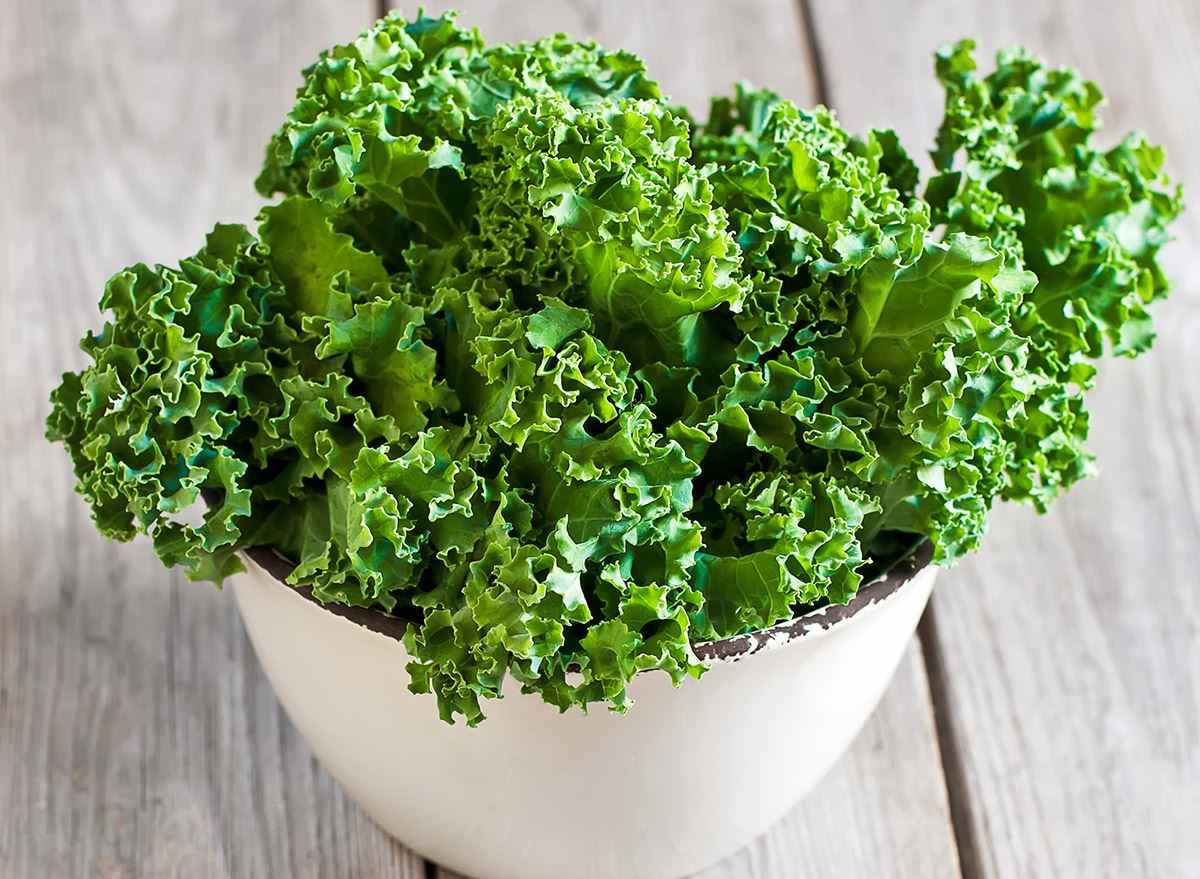
Sleeping poorly? That’s no excuse to cut out kale. “You SHOULD be eating dark leafy greens with dinner,” says celebrity nutritionist Dr. Daryl Gioffre (who has worked with Kelly Ripa). “They’ll give you plenty of fiber, prebiotics, and probiotics, which help keep your colon clean.” And, like spinach, kale is packed with calcium, which helps your body produce sleep-inducing melatonin, he says.
If you have the option between sauteing the chewy green and eating it raw, Dr. Gioffre recommends opting raw, because the heat may reduce the food’s vitamin C contents.
One caveat: Because leafy greens are so full of slow-digesting fiber, he recommends giving the leaves about three hours to move through your system before shutting your eyes. So, avoid kale on the nights when you plan to snooze immediately after snacking.
Chicken Noodle Soup
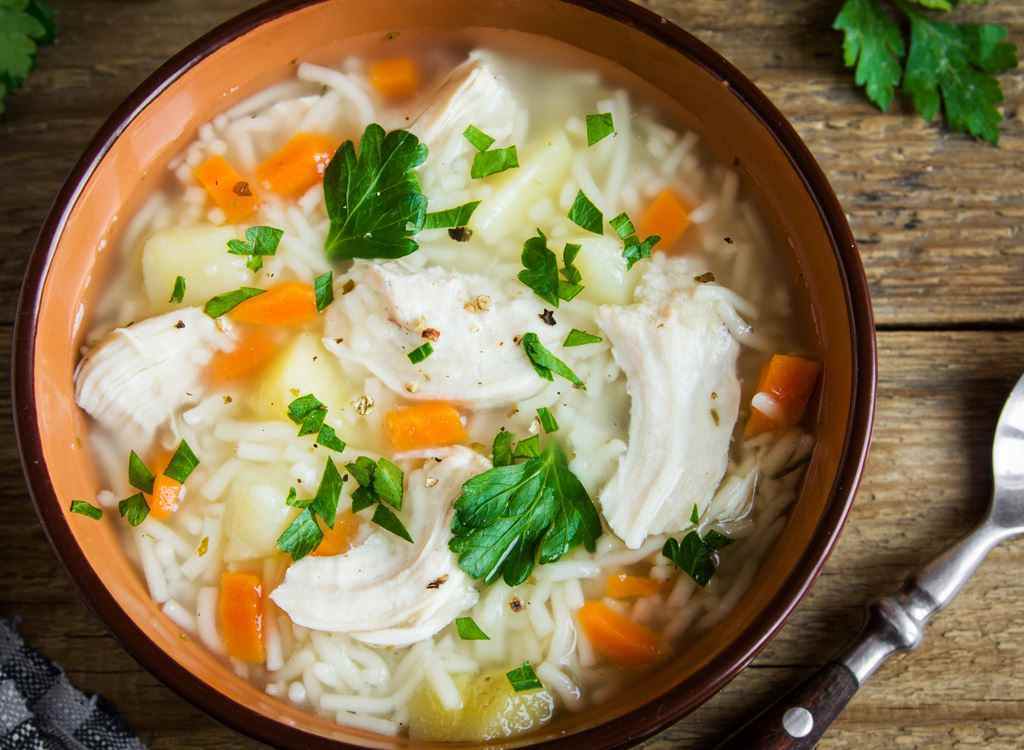
The ultimate comfort food, the fact that chicken noodle soup is soothing is exactly what makes it such a good bedtime snack. “Foods that are comforting (such as chicken soup) can help your nervous system to power down and relax to give your whole body a sense of safety,” says acupuncturist and Chinese medicine specialist Tsao-Lin Moy. Plus, soup is easy for the body to digest, he says, so you won’t be kept up with indigestion. If you’re going the store-bought route, opt for a lower-sodium option. Too much salt can keep you wide awake.
Try our chicken noodle soup recipe, or pick up one of the best-tasting canned options (according to our taste test).
Sweet Potato
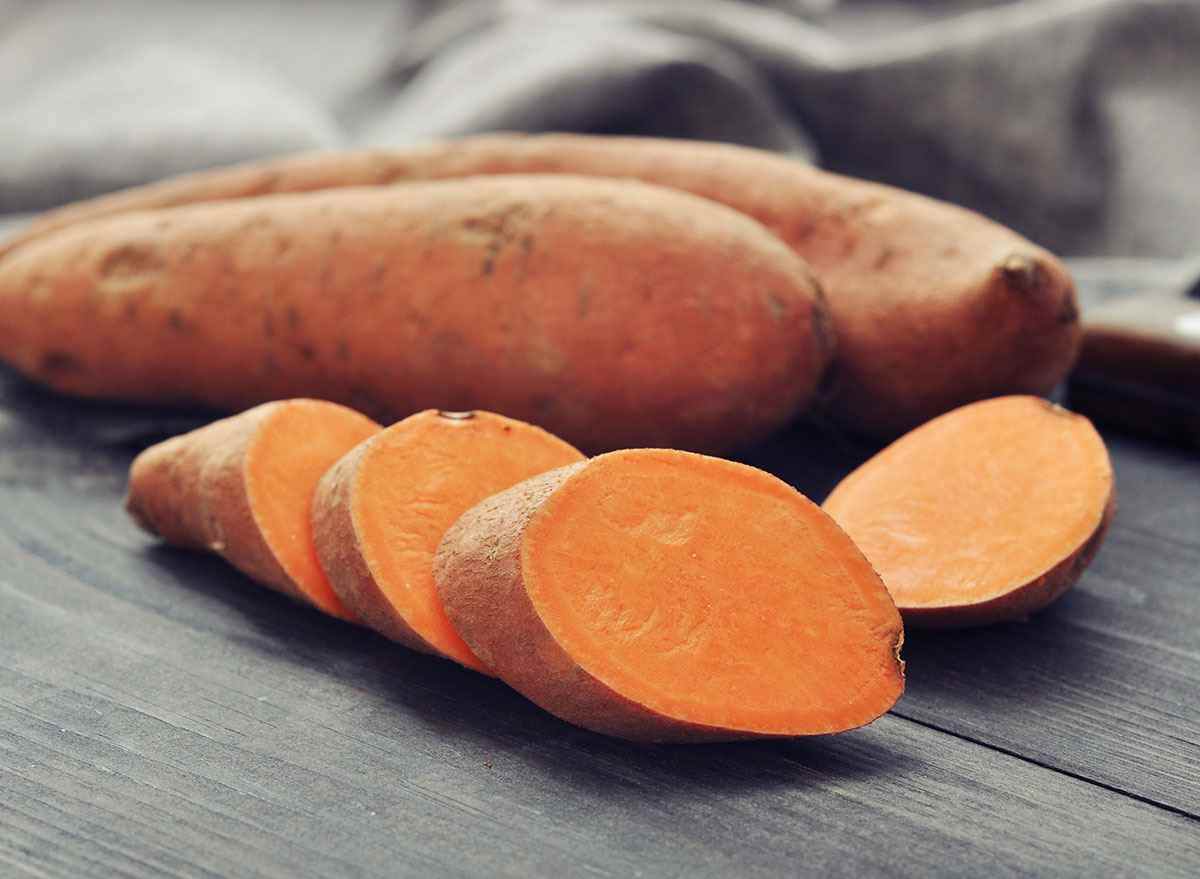
So long as they’re not in french fry form, sweet potatoes can help you sleep better! Registered dietitian Lisa Mastela, MPH, RD, founder and CEO of Bumpin Blends explains: “Sweet potatoes contain B6 which boosts mood and melatonin which prepares for sleep, so eating sweet potatoes help you feel both relaxed and sleepy.” Plus, the veggie is fiberlicious, so you don’t have to worry about waking up hungry in the middle of the night. How’s that for a win-win-win?
Try one of our 25 Healthy and Delicious Sweet Potato Recipes.
White Rice
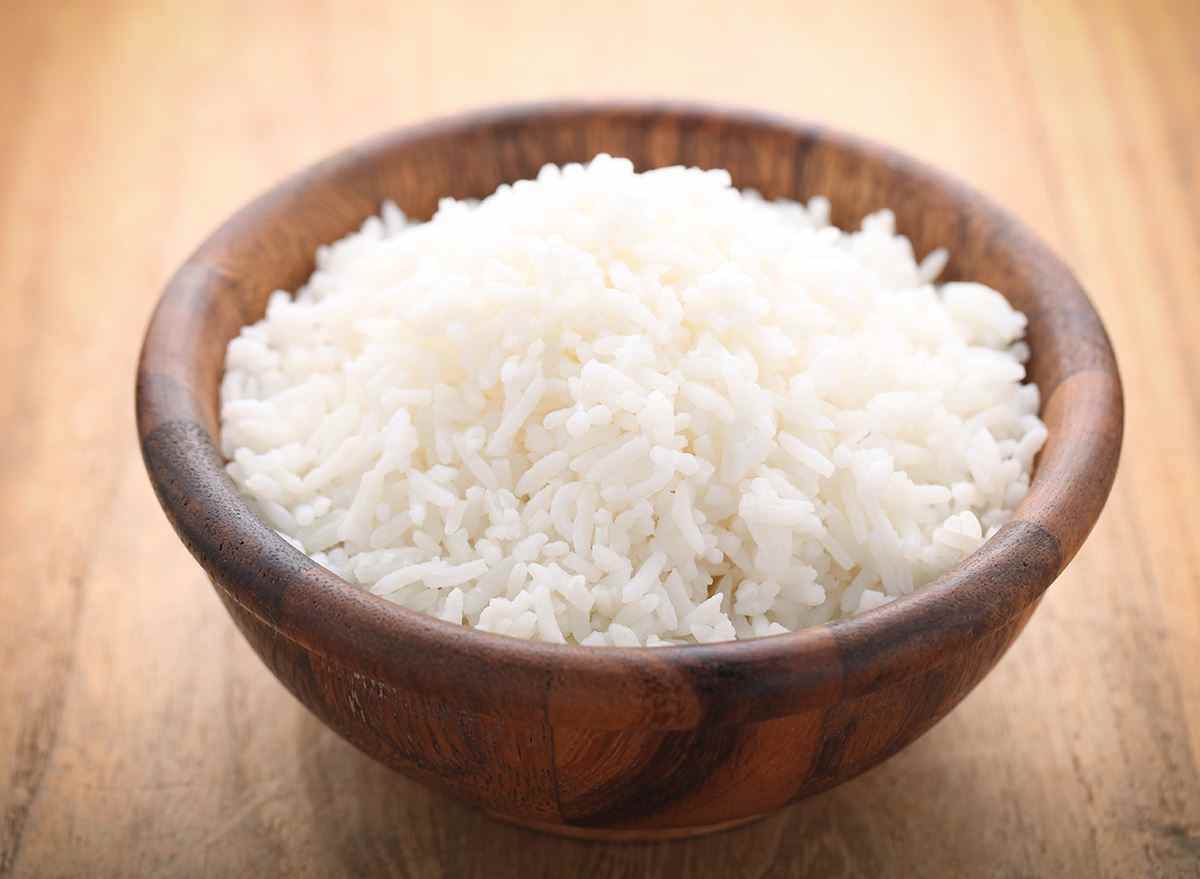
Yup! Keep whatever’s left of white rice that came complimentary with your last sushi or Chinese food order. Eating it before bed can decrease how long it takes to fall asleep, according to Richards. “White rice is high in carbohydrates, which are thought to promote a sense of fullness and restfulness.” And, it also has a high glycemic index, which is thought to decrease the amount of time it takes to fall asleep, she says.
Just be sure to stick to a one-cup serving. While it can help you snooze, it’s not the healthiest food in the world. One cup has 250 calories, less than 1 gram of fiber per serving, and very little protein.
Fatty fish
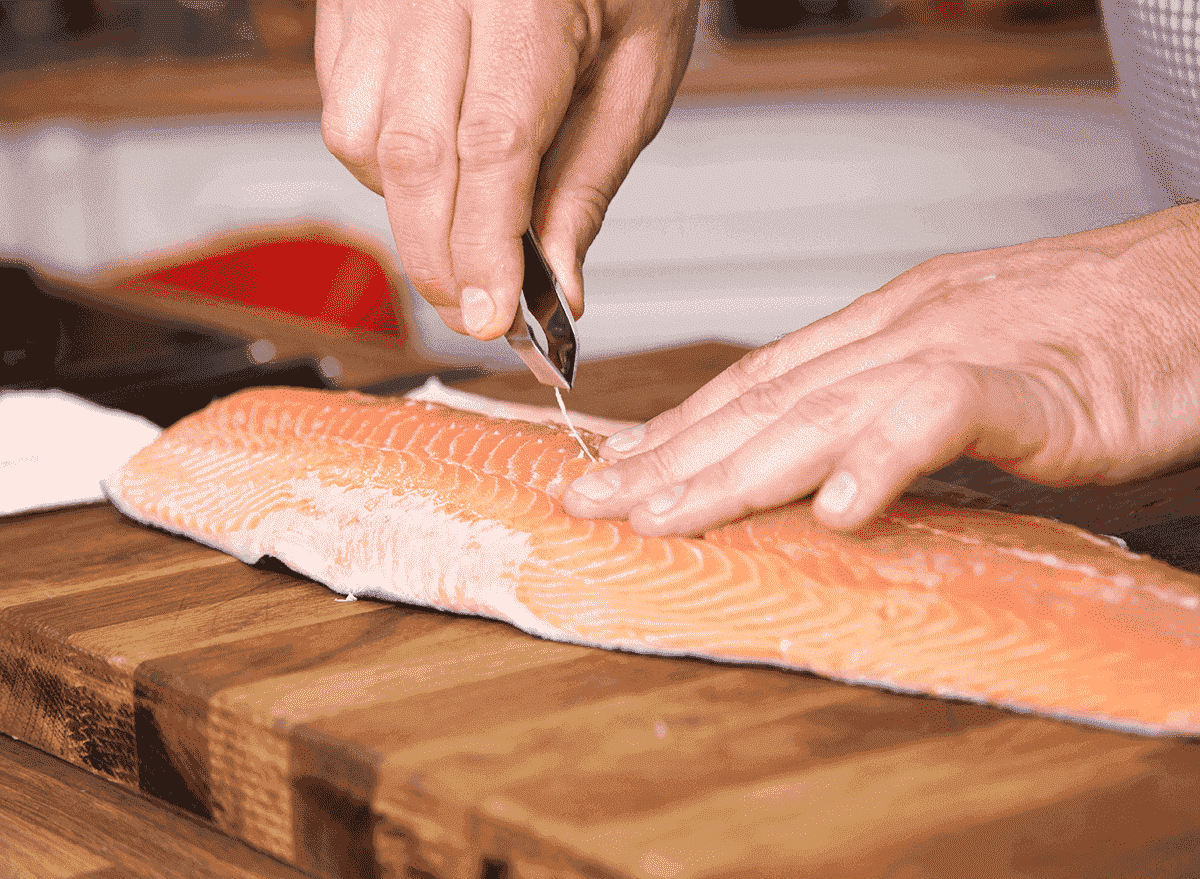
Forking into a fish dinner before bed is a great way to ensure you’ll get a good night’s rest. Fatty fish such as salmon, herring, and sardines contain both omega-3 fatty acids and vitamin D, nutrients important for the regulation of serotonin, which regulates sleep, a study in Advances in Nutrition states. Another study in the Journal of Clinical Sleep Medication investigated the effects of eating fatty fish on slumber and found that those who ate 10.5 ounces of Atlantic salmon three times a week for six months fell asleep about 10 minutes faster than those who didn’t eat fish.
Try one of our 21+ Best Healthy Salmon Recipes.
Kiwi
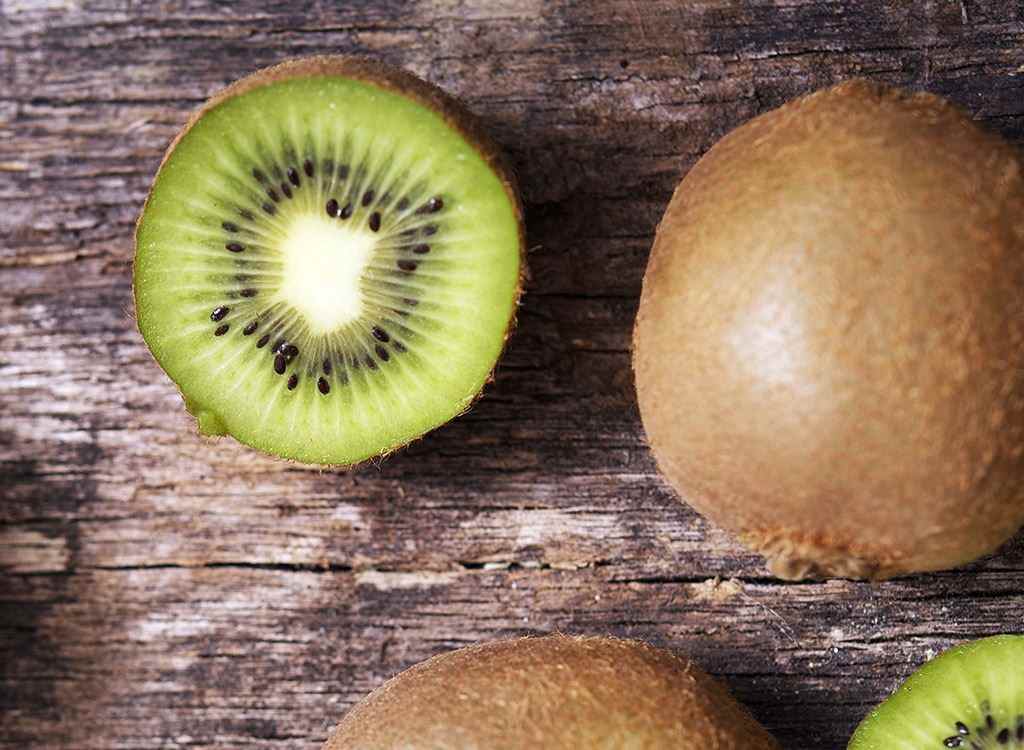
Get under the down comforter with this sleep-inducing food from Down Under. Participants who consumed two kiwifruits 1 hour before bedtime nightly for 4 weeks fell asleep 35 percent faster than those who didn’t eat the New Zealand fruit, a study in the Asia Pacific Journal of Clinical Nutrition found. Besides being rich in antioxidants, carotenoids, and vitamins C and E, it also contains a familiar hormone, serotonin. This sleep hormone is related to rapid eye movement (REM) sleep and its low levels may cause insomnia. Similarly, kiwi is rich in folate, and insomnia is one of the health issues that are a symptom of folate deficiency.
RELATED: Get lean for life with this 14-day flat belly plan.
Cherries
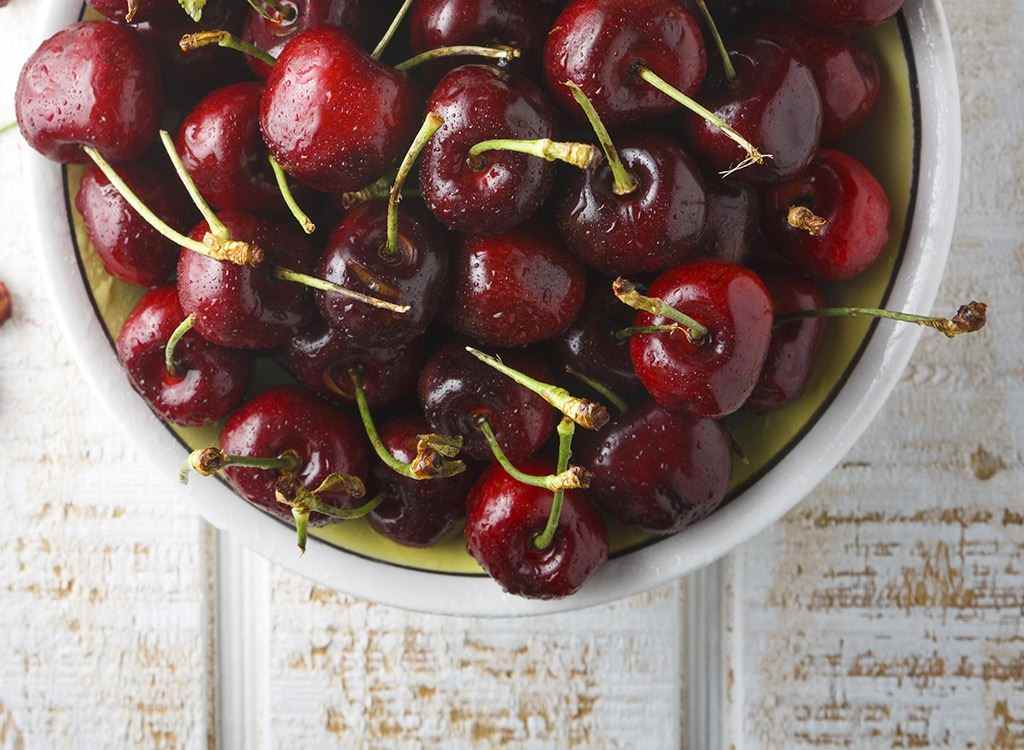
Sleep is a huge part of making any diet and exercise plan work, as it allows your body to process and to recover from all the sweat and breakdown of muscle. And cherries are the perfect fruit for the job. A study published in the European Journal of Nutrition found that people who drank just one ounce of tart cherry juice a day reported that they slept longer and more soundly than those who didn’t. So what’s going on here? Cherries act as a natural sleep aid thanks to their melatonin content, a naturally produced hormone that signals to our bodies that it’s time for bed. So enjoy a cup of cherries for dessert—they’ll help you maintain your toned physique by replacing less virtuous desserts and moving along your snooze process.
Cereal with skim milk
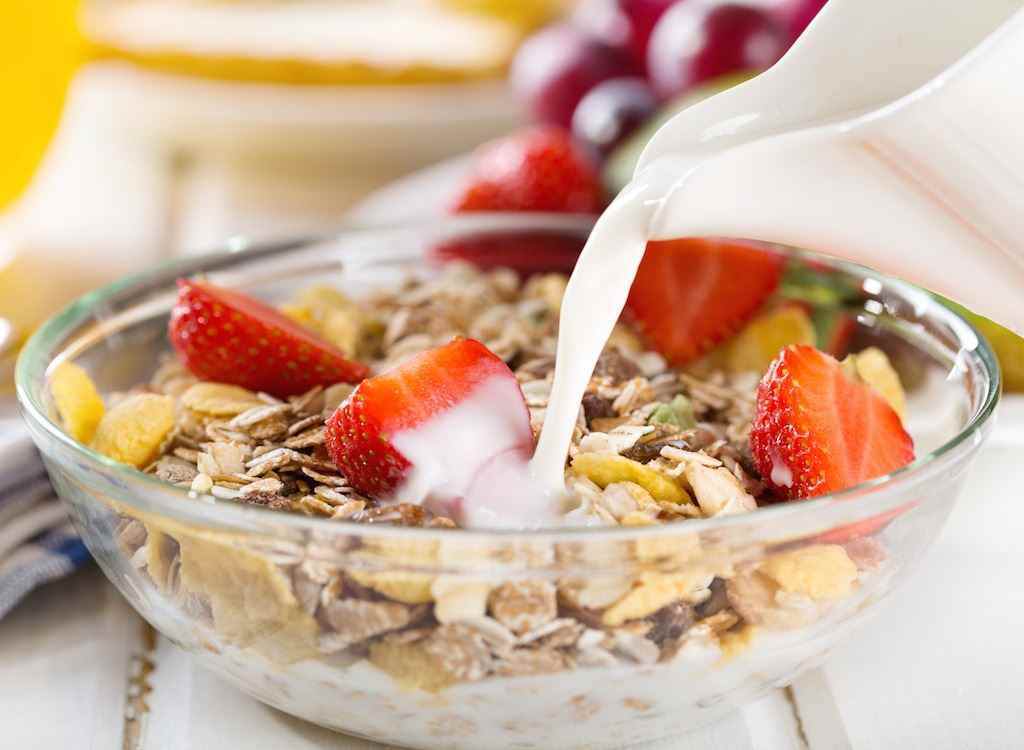
Although it’s traditionally considered a breakfast option, a low-sugar cereal paired with skim milk is a perfect bedtime snack. Milk contains the amino acid tryptophan, which serves as a precursor for the hormone serotonin, a sleep-inducing agent. (Just make sure your milk is skim. Higher fat whole milk will take your body longer to digest, keeping your body working late rather than snoozing.)
And according to a study in the American Journal of Clinical Nutrition, eating a high-glycemic carb like jasmine rice (or rice cereal) 4 hours before bed can cut the amount of time it takes to fall asleep in half compared to a low-GI food. This is because high-glycemic carbs, which spike insulin and blood sugar more quickly than low-GI foods, can help increase the ratio of tryptophan circulating in your blood by siphoning off other amino acids to your muscles. This lets the tryptophan outcompete those other amino acids for entrance into your brain, allowing more of the sedative to signal it’s time to put your head to the pillow.
Bananas
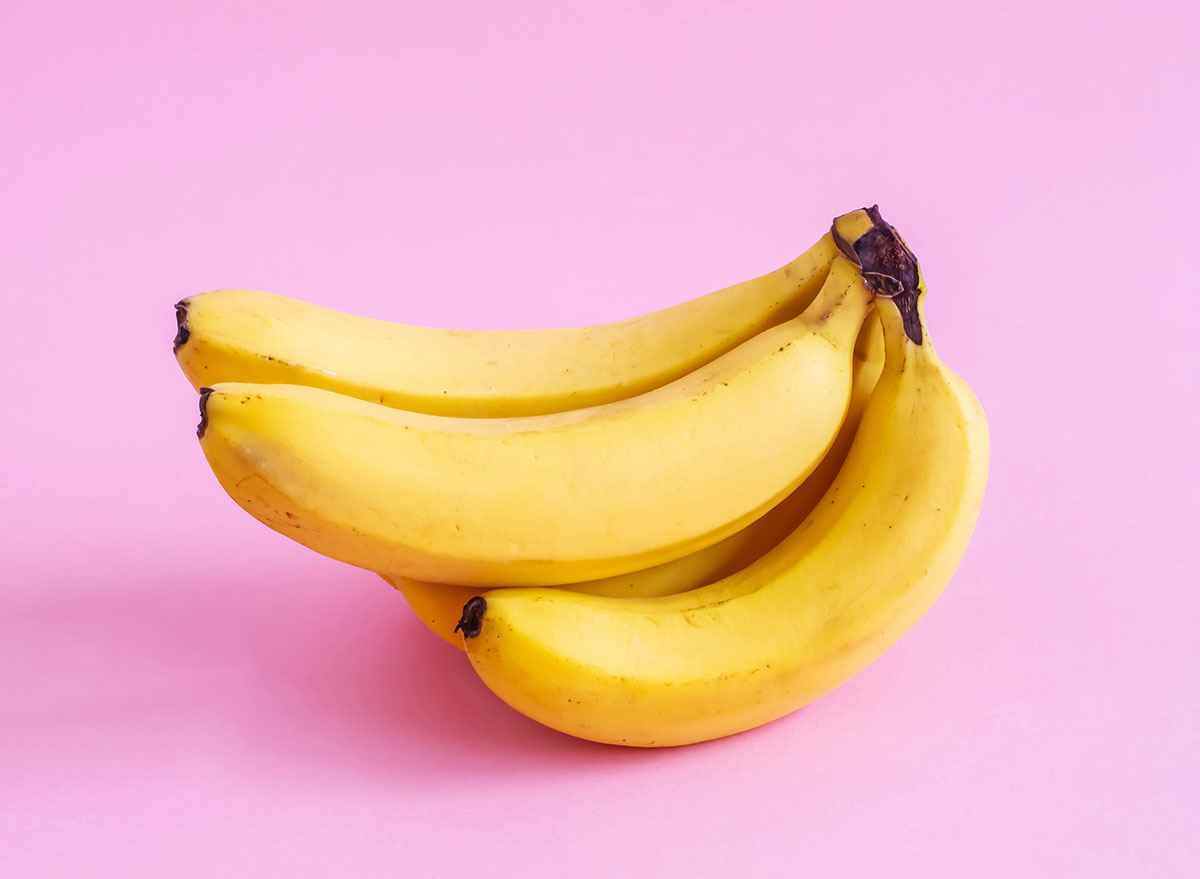
Because they’re an excellent source of both potassium and magnesium, bananas can put your body into a sleepy state by helping with muscle relaxation. In a study in the Journal of Research and Medical Sciences, magnesium had a positive effect on the quality of sleep in older adults with insomnia by extending the time they spent sleeping in bed (rather than just lying there) and making it easier to wake up. Bananas also contain tryptophan, the precursor to calming and sleep-regulating hormones serotonin and melatonin.
Try one of our 20 Healthy Banana Bread Recipes.
Almonds
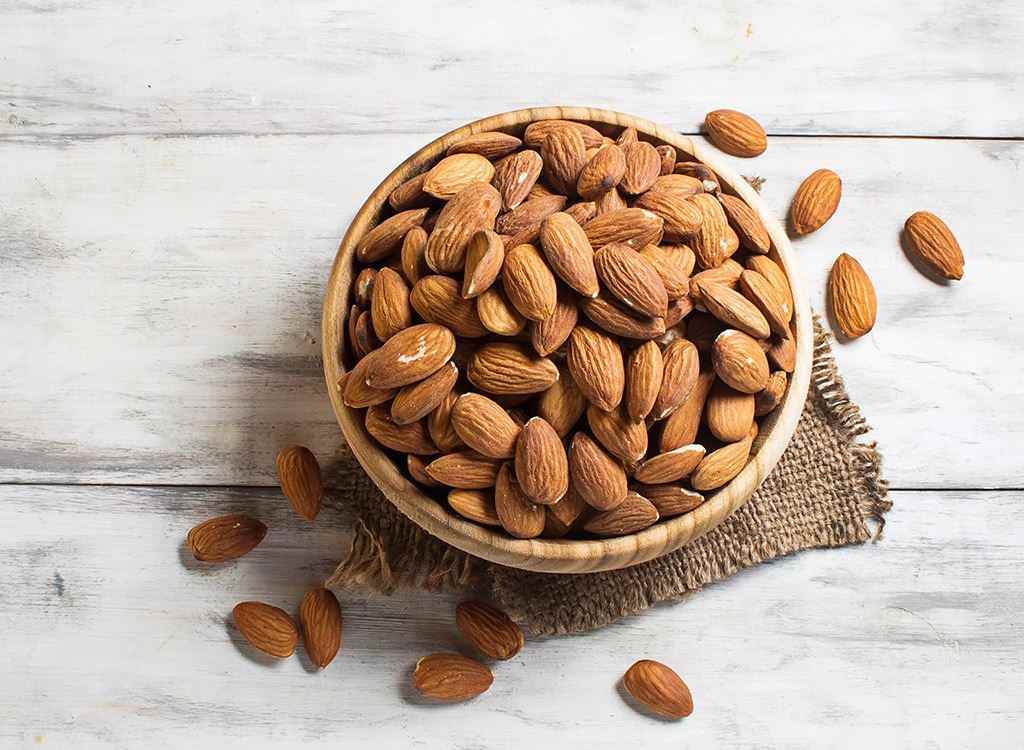
Another great muscle-relaxing magnesium source? Nuts! Cashews and peanuts are good, but almonds are deemed one of the best foods that help you sleep. That’s because almonds (one of our must-have staples for a flat-belly kitchen) are also high in calcium. This tag team works together to calm the body and relax muscles. Calcium plays its role by helping the brain convert the amino acid tryptophan into sleep-inducing melatonin. This also explains why dairy products which contain both tryptophan and calcium, are one of the top sleep-inducing foods.
Spinach
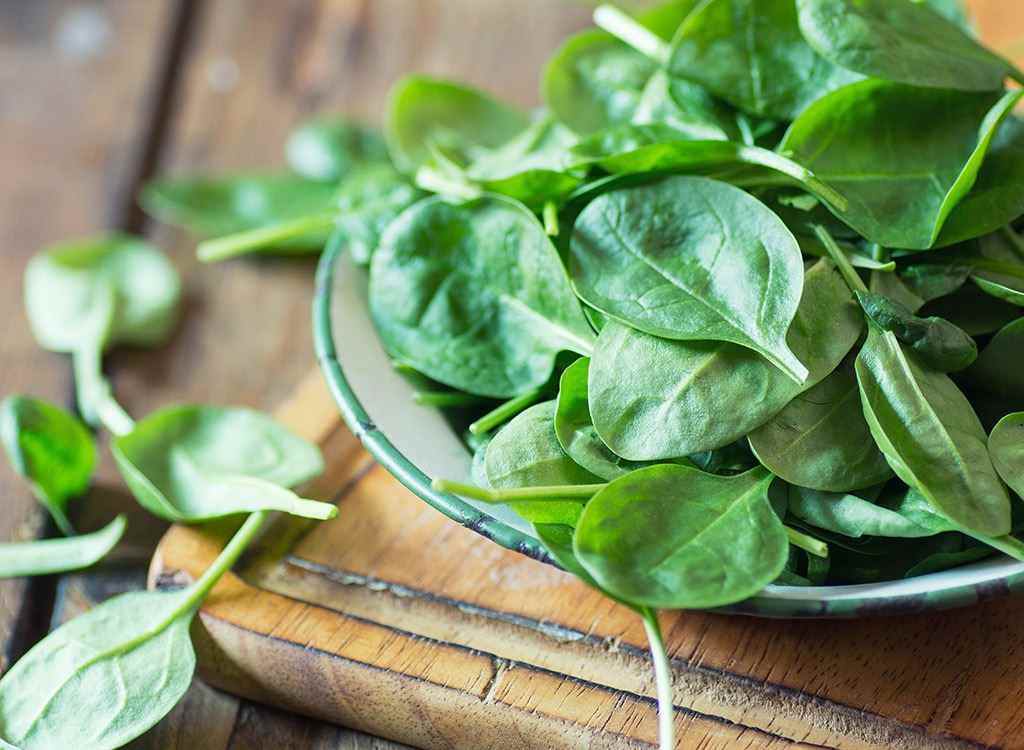
Yet another reason to love this versatile food. With its long list of sleep-inducing nutrients, spinach is an insomniac’s best friend. Not only is it a source of tryptophan, but the leafy green is also an excellent source of folate, magnesium, and vitamins B6 and C, which are all key co-factors in synthesizing serotonin, and subsequently, melatonin. Spinach also contains glutamine, an amino acid which stimulates the body to get rid of the cellular toxins that lead to sleeplessness.
When it comes to cooking spinach, avoid the flame. Heat breaks down glutamine as well as vitamins C and B, so it’s best to eat spinach raw—combine with a banana and almond milk for the perfect before-bed snack. For more tips on preparing foods for the most health benefits, don’t miss our report, how to extract the most nutrients from your food.
Turkey
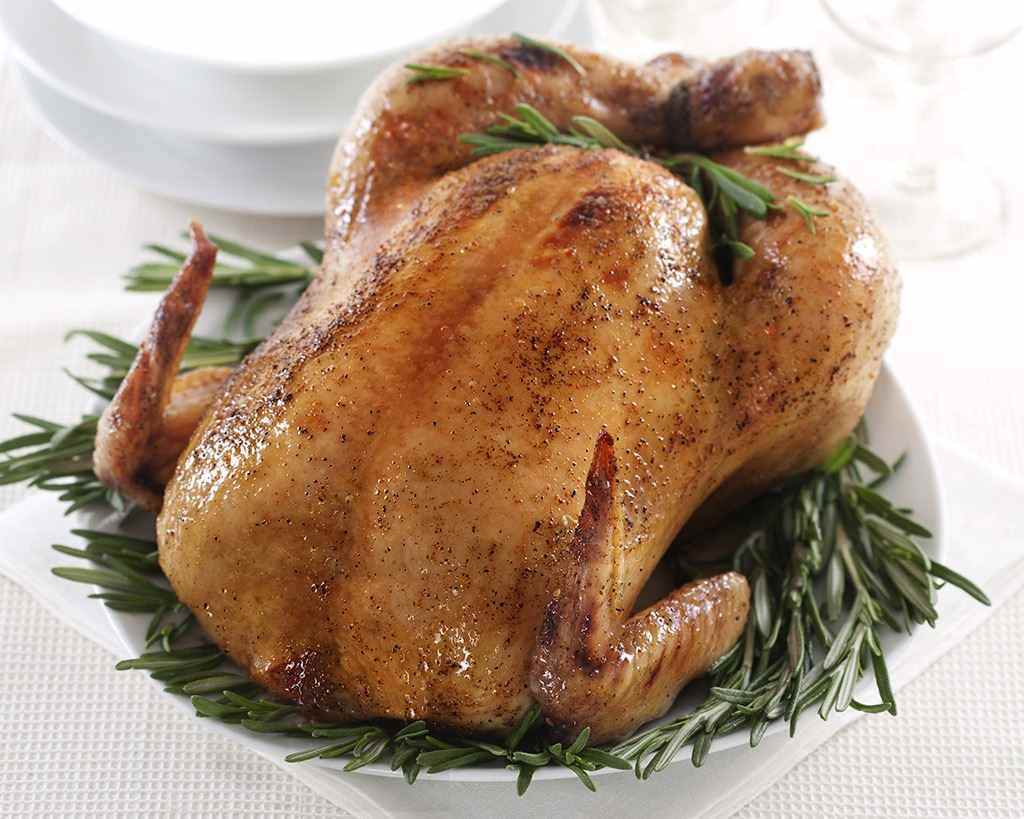
Don’t count sheep, eat turkey! Tryptophan, an amino acid found in most meats, has demonstrated powerful sleep-inducing effects. A recent study among insomniacs found that just 1/4 gram—about what you’ll find in a skinless chicken drumstick or three ounces of lean turkey meat—was enough to significantly increase hours of deep sleep. And that can translate into an easy slim-down. Pair your source of tryptophan with a carbohydrate-rich food like brown rice (also high in sleep-supporting magnesium and vitamins B3 and B6) to enhance the eye-shutting effects.
Try one of our 31+ Best Healthy Ground Turkey Recipes.
Low-fat yogurt parfait
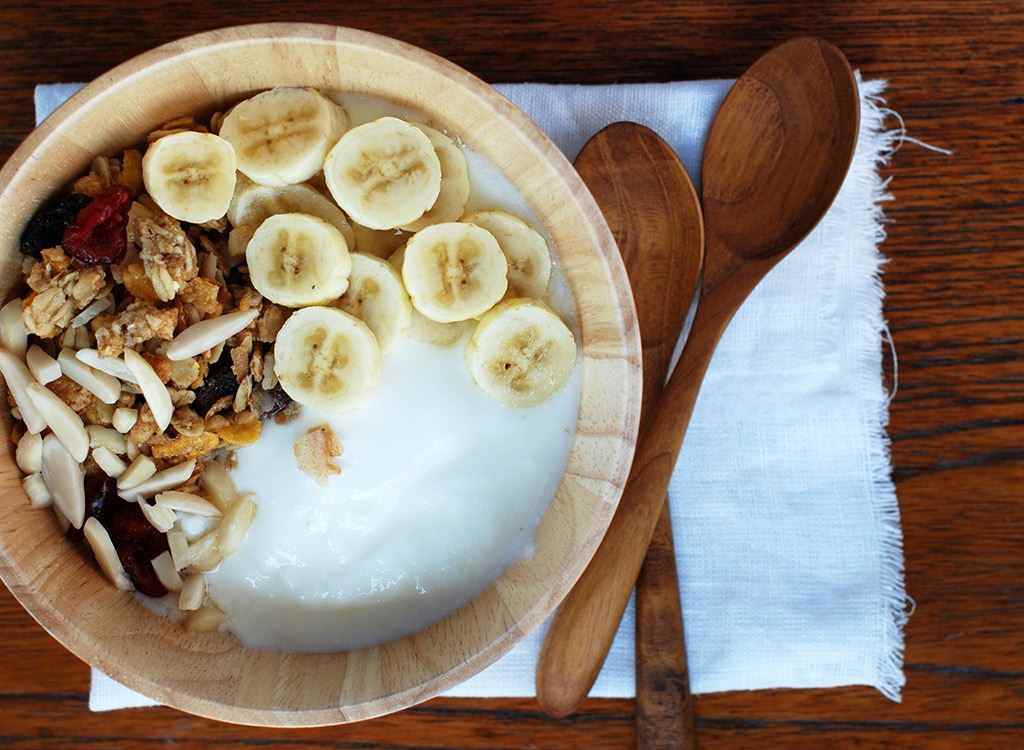
For a tryptophan triple treat, combine low-fat Greek yogurt, honey, and some banana. Yogurt and bananas both contain tryptophan, and the carbs from the banana will help the tryptophan-rich foods get absorbed by the brain. Need something a bit more filling? Mix in some raw oats (they’ll soften in the yogurt), which are a prime source of tryptophan.
Peanut butter on whole-grain toast
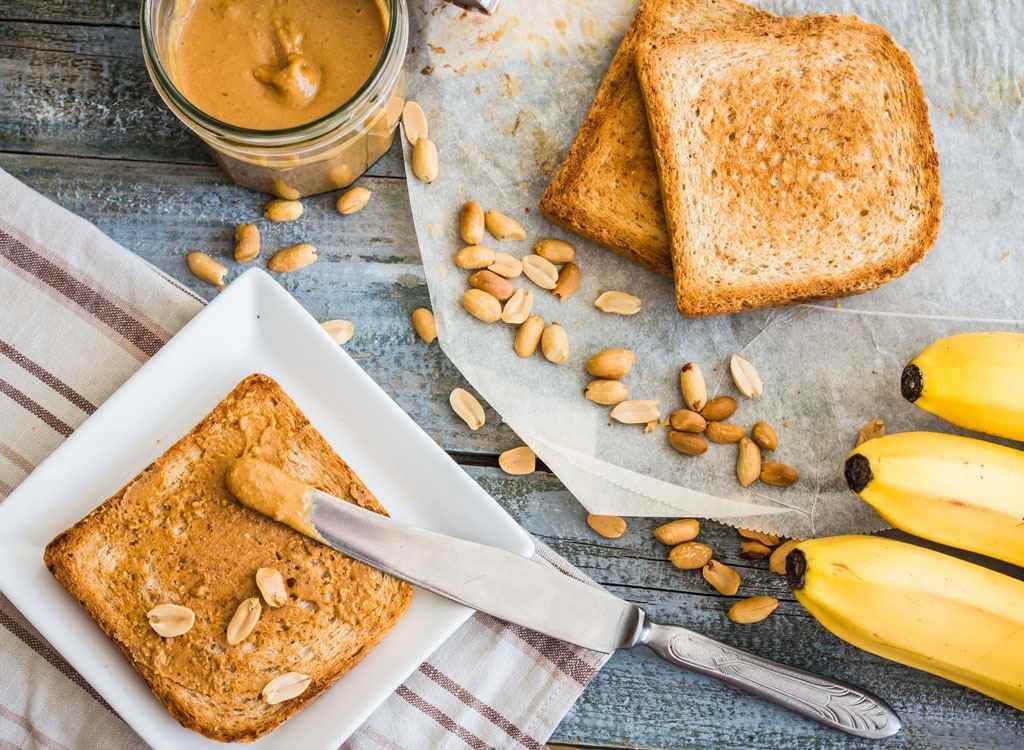
The “whole” part is important. Whole grains include the germ of the grain, which is removed during the refining of whole wheat grains into white flour. This germ includes important B vitamins such as folate and vitamin B6—both important micronutrients required for proper absorption of tryptophan—as well as magnesium to loosen your muscles. Pair it with tryptophan-containing peanut butter (and perhaps some bananas and honey) to help you catch some ZZZs.
Cottage cheese
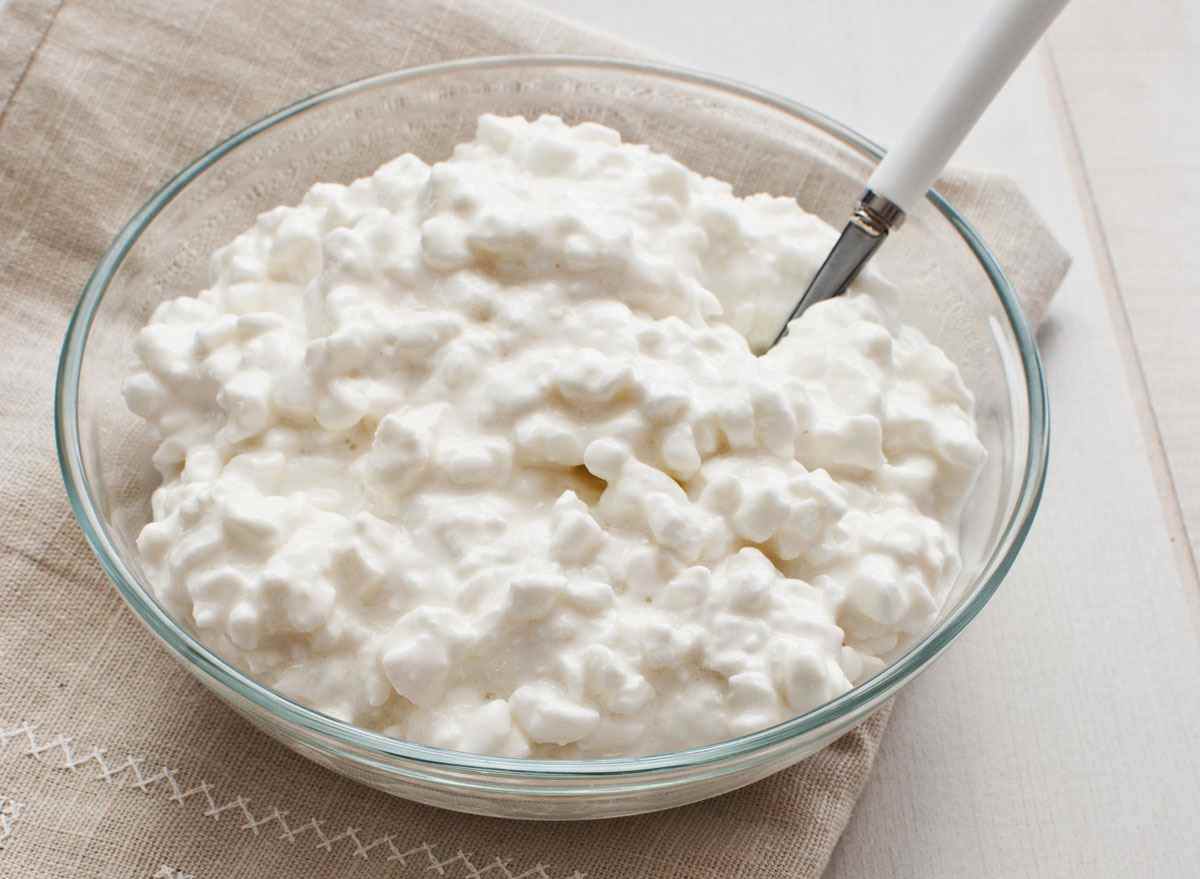
Completely avoiding food before bedtime can actually be bad for your weight loss goals. Instead of going to sleep with a rumbling belly, have a little cottage cheese. Not only is it rich in casein protein—a slow-releasing milk protein that will keep hunger at bay through the night—it also contains the amino acid tryptophan. Mix it with hummus for a savory spread and an added tryptophan boost (the amino acid is also found in chickpeas!), or with guacamole for some muscle-relaxing magnesium!
Try one of our 18 Clever Ways to Eat Cottage Cheese.
Passionflower tea
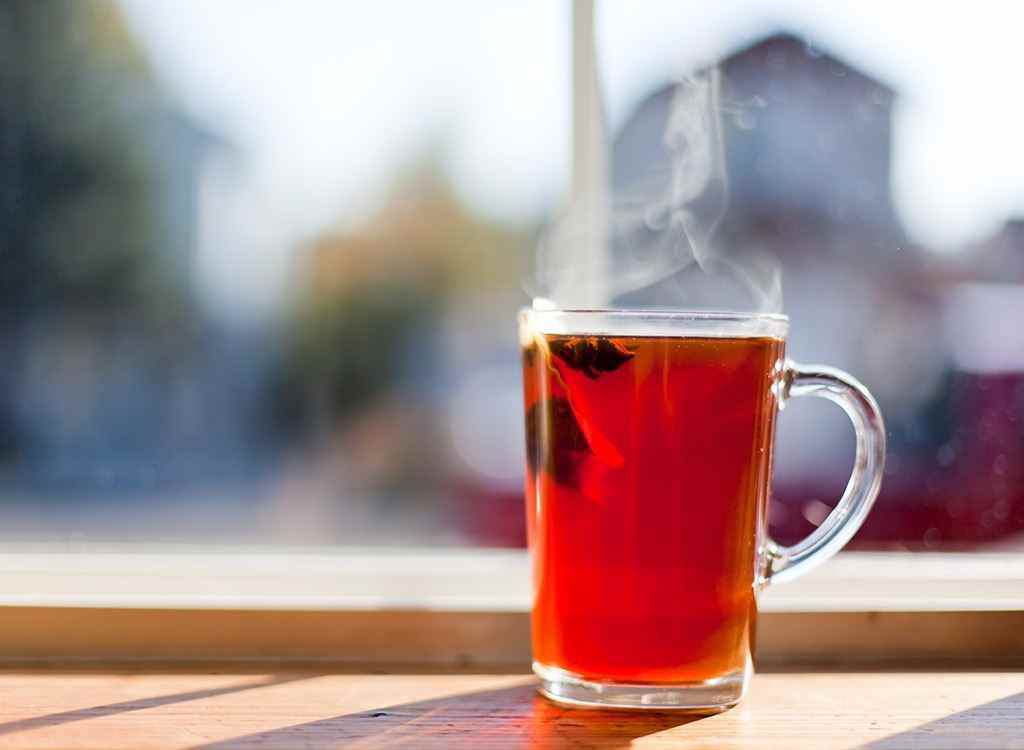
What ailment can’t be solved with a cup of tea? At least not sleeplessness! Many herbal teas offer sedative effects through their flavones, flavonoids, and resins. For starters, passionflower tea has the flavone chrysin, which has wonderful anti-anxiety benefits and is a mild sedative, helping you calm nervousness so you can sleep at night.
Lemon balm tea
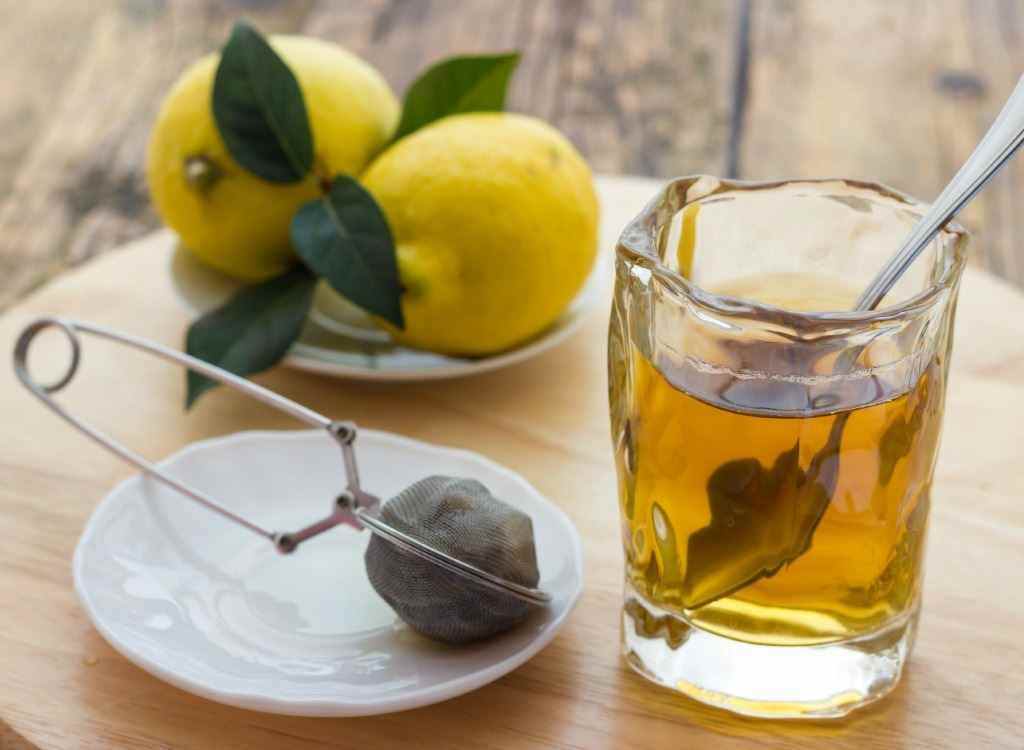
Another relaxing tea is lemon balm. The tangy tea serves as a natural sedative, and researchers reported that they observed reduced levels of sleep disorders among subjects using lemon balm versus those who were given a placebo.
Valerian tea
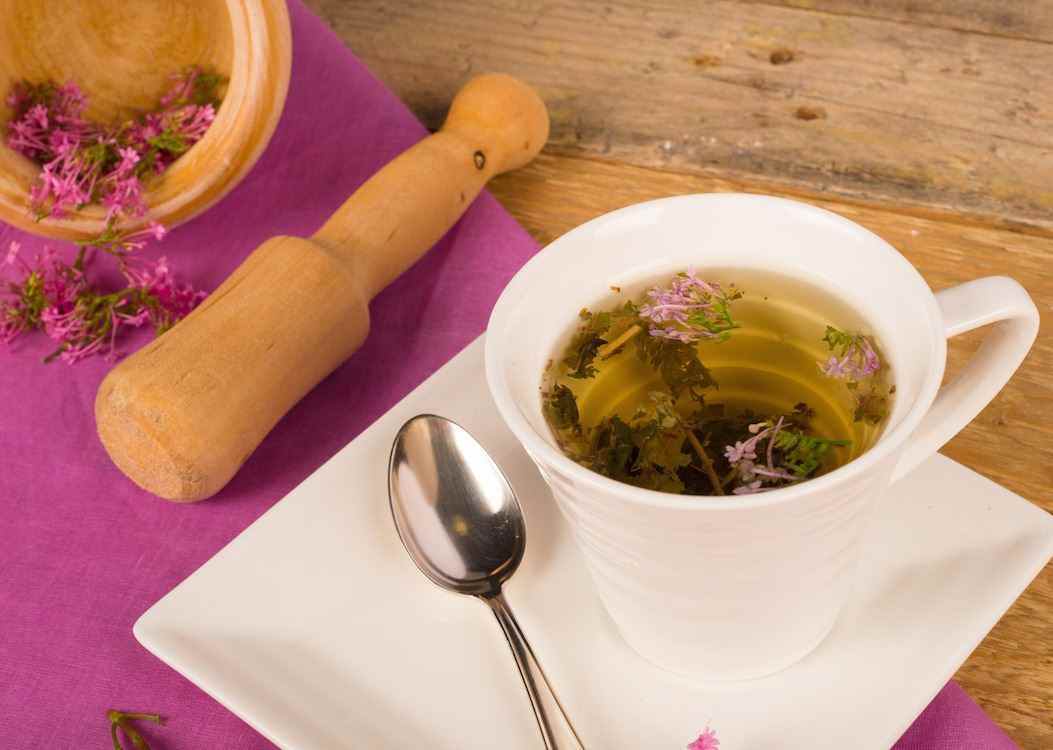
Valerian is a herb that’s long been valued as a mild sedative, and now research is showing what tea enthusiasts have known for centuries. In a study of women in the journal Menopause, researchers gave half the test subjects a valerian extract and half a placebo. Thirty percent of those who received valerian reported an improvement in the quality of their sleep, versus just 4 percent of the control group. While researchers have yet to identify the exact active ingredient, they suspect that receptors in the brain may be stimulated to hit “sleep mode” when coming in contact with valerian.
Hop tea
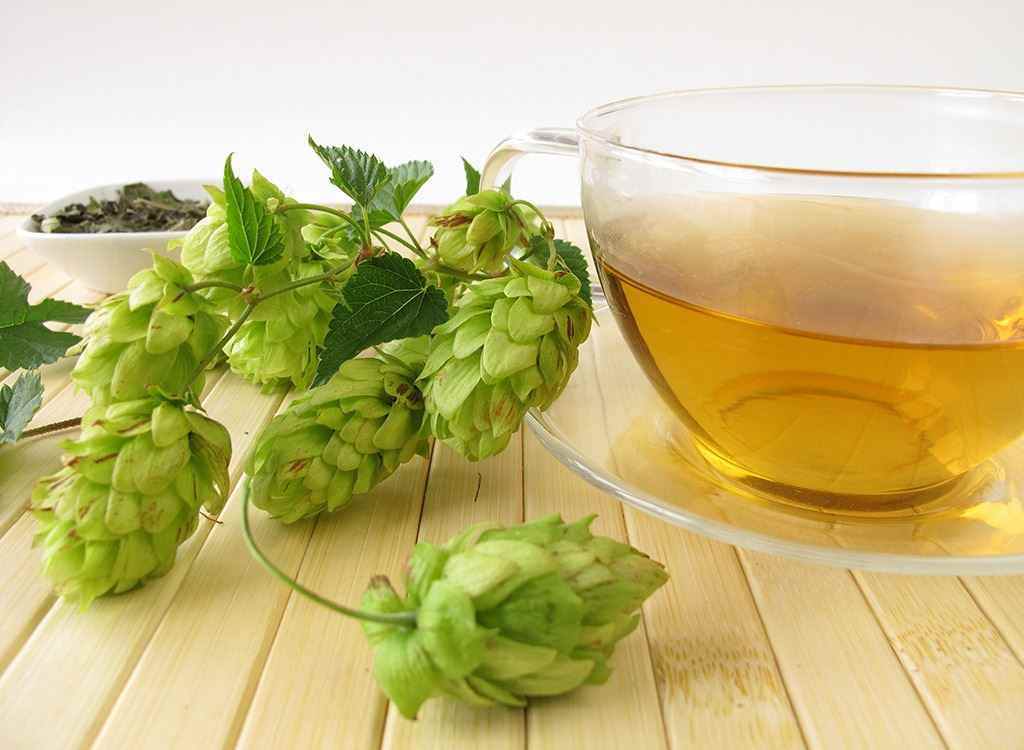
Legend has it that when workers were gathering hops for the master brewer’s latest beer, they kept falling asleep on the job! People began to realize there was a sedative property to the hops, and they started using them in teas to aid with sleeplessness. Now, researchers found its pharmacological activity is due primarily to the bitter resins in its leaves. Acting in a similar way to melatonin, hops increase the activity of the neurotransmitter GABA, which helps combat anxiety. While hops have been used for centuries to aid with sleep, studies have only been able to prove its effectiveness when combined with valerian.
Looking for more helpful tips? Sign up for our newsletter to get daily recipes and food news in your inbox!
And Now… The Worst
Ice Cream
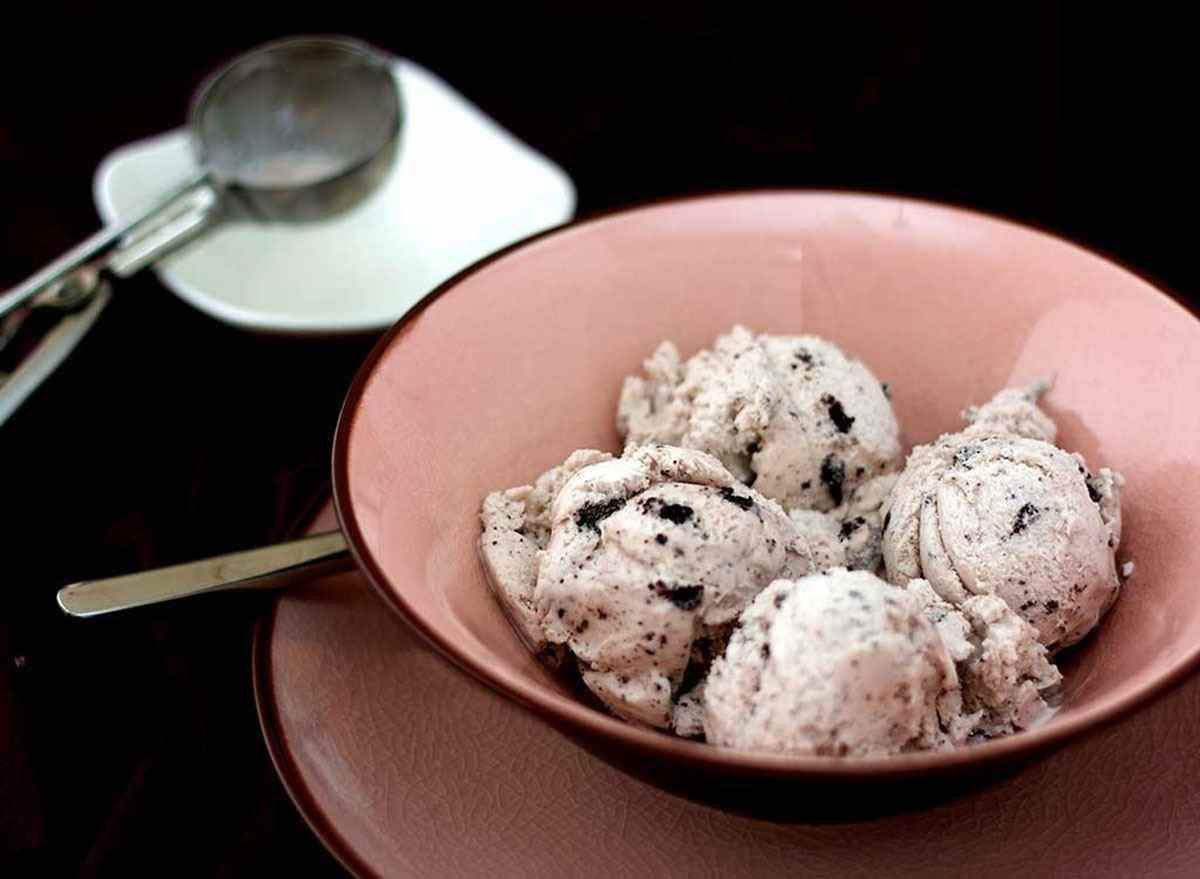
That serving of Ben & Jerry’s you’ve been spooning before crawling between the sheets isn’t doing your sleep schedule any favors. Functional medicine guru Dr. Josh Axe, D.N.M., C.N.S., D.C., founder of Ancient Nutrition, author of the best-selling books KETO DIET and COLLAGEN DIET explains explains: For starters, “Ice cream is high in sugar, which can spike your insulin levels. And high insulin levels have been shown to make it difficult to fall asleep,” he says. Beyond that, most folks eat ice cream late at night—as opposed to at, like, six pm. “Late night snacking on ice cream can lead to increased cortisol levels, which is the stress hormone that can make it difficult to fall asleep as well,” he says.
Of course, there’s some nights when a bowl of the Chunky Monkey is worth the restlessness that follows. But you might try whipping up a serving of frozen banana “ice cream”, which tastes shockingly like the real deal. Plus, bananas (as we said) actually promote sleep.
Grapefruit
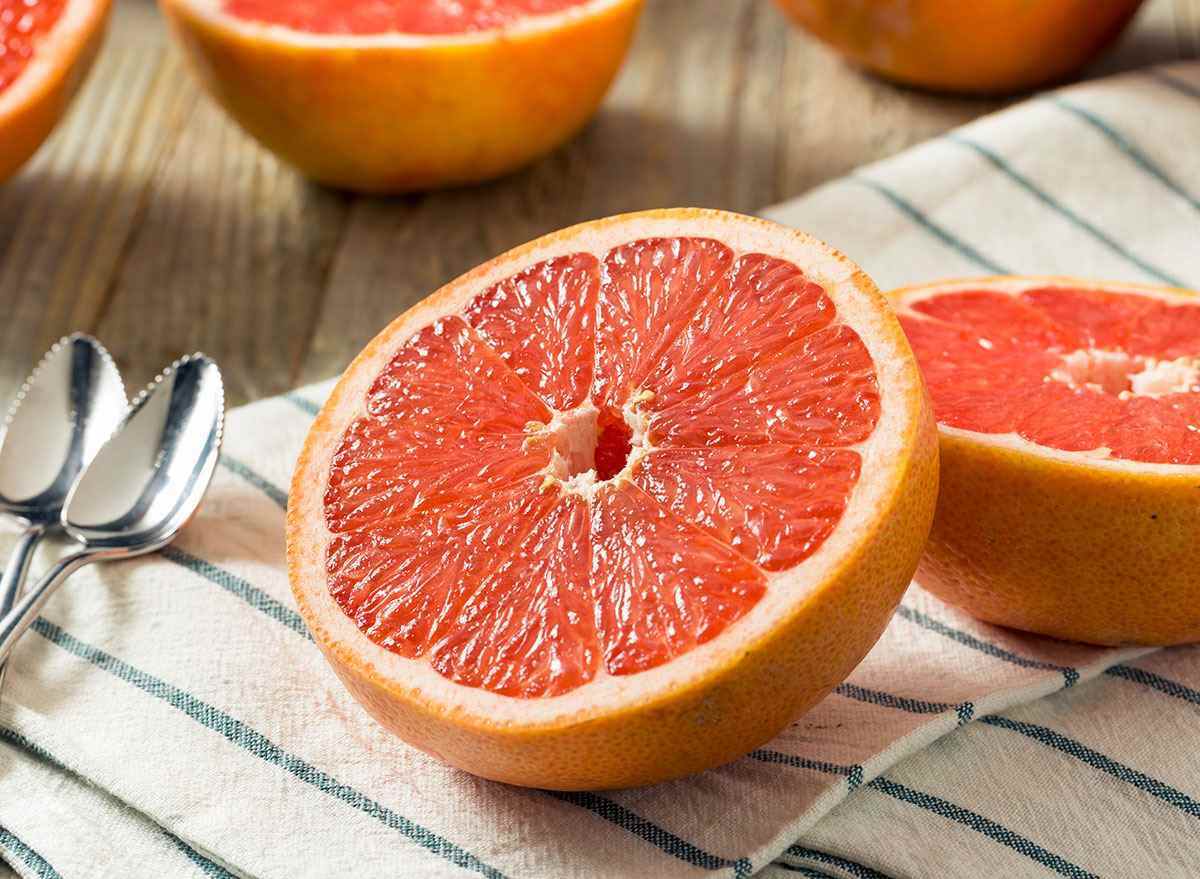
“Highly acidic foods can worsen symptoms of heartburn by relaxing the lower esophageal sphincter, which can cause sleep-disrupting acid reflux,” says Dr. Axe. And unfortunately, it doesn’t get much more acidic than grapefruits and oranges. If it’s a healthy dessert that you’re after, check out this list of 73+ Healthy Dessert Recipes.
Tomato
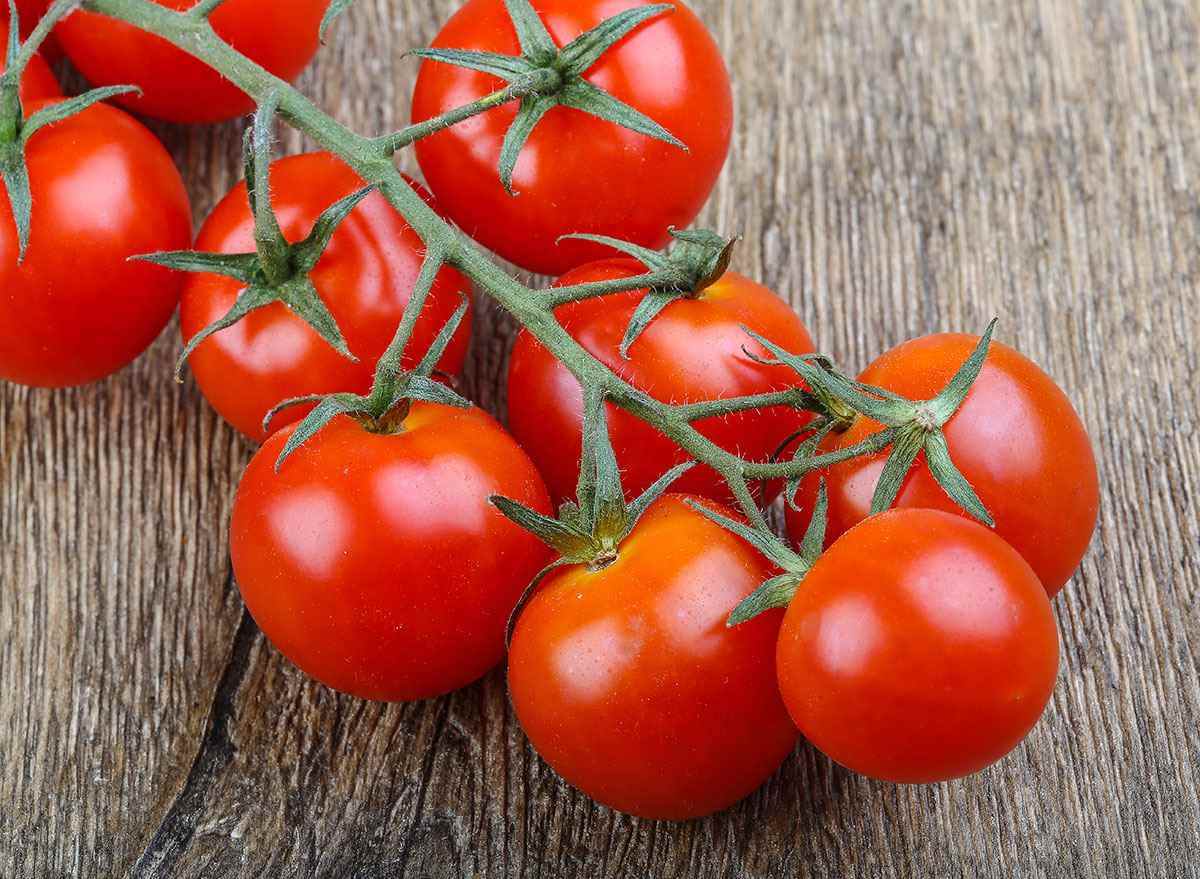
Another fruit (yes, that says fruit, not vegetable) that’s super acidic? Tomatoes. “Tomatoes and tomato-based products can really wreak havoc on your ability to sleep,” says registered dietician Amanda Kostro Miller, RD, LDN, who serves on the advisory board for Fitter Living. The reason? Again, heartburn.
Cheese
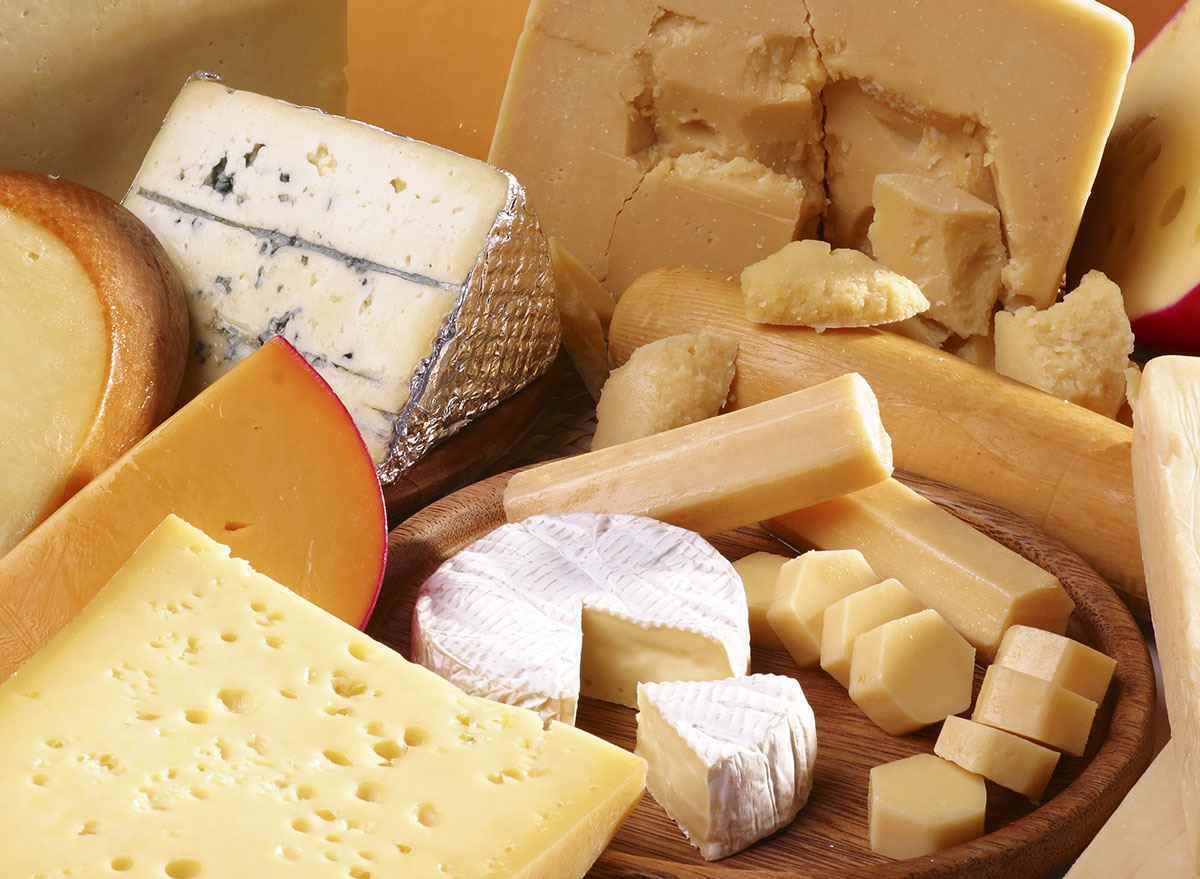
Spoiler alert: If you have any even a little bit of dairy intolerance or allergy, and you chow down a cheese platter before bed, it’s going to disrupt your Zzz’s. At least according to Moy, “Any intolerance can cause inflammation, gas and bloating, which can lead to pain and discomfort that make it harder to get quality sleep.”
Even if you’re not dairy-adverse, according to Dr. Axe, there are cheeses you should avoid. He explains: “Aged cheeses contain tyramine, an amino acid that increases the production of norepinephrine—a neurotransmitter released during stressful situations as part of the fight-or-flight response— which can lead to increased alertness and decreased sleep quality,” he says. So save the gouda for your morning omelette, and opt for cheese like goat cheese, crumbly feta, and halloumi at night.
Wine
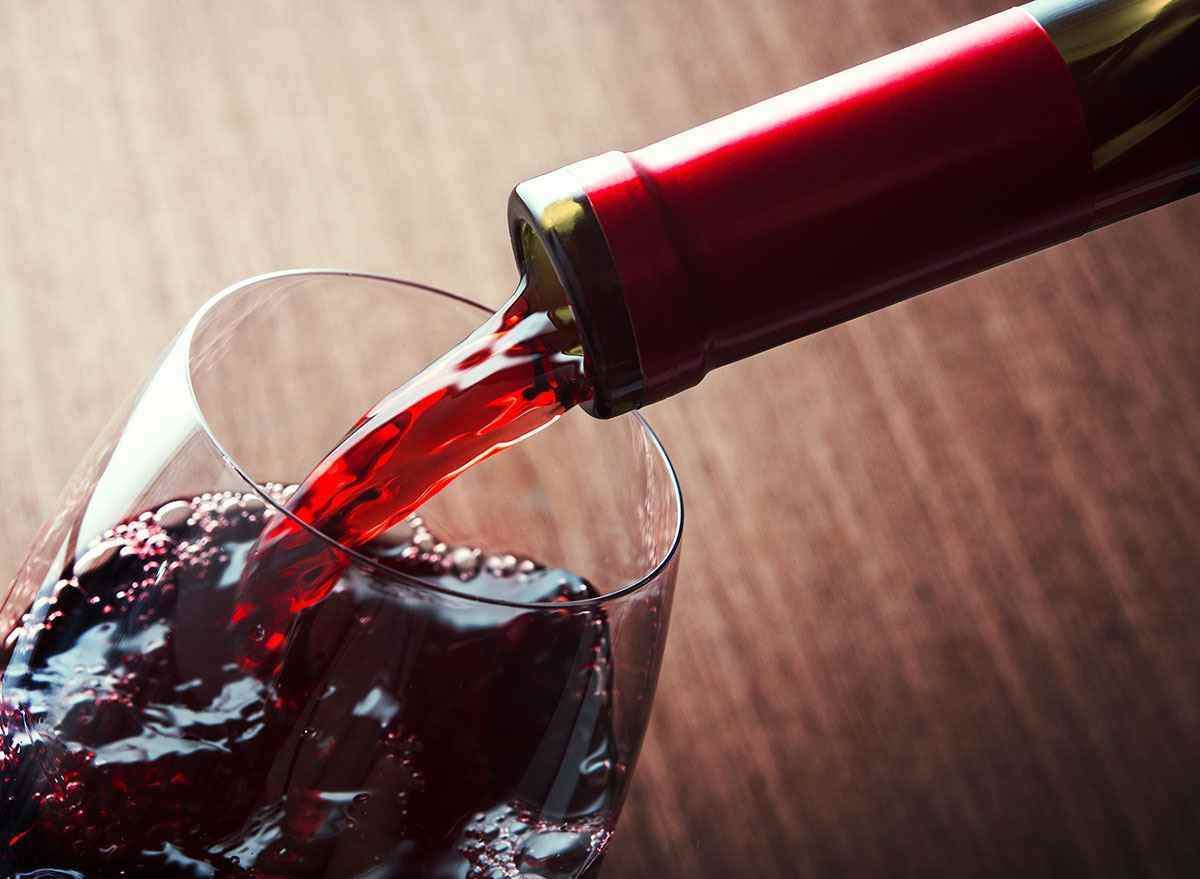
That relaxing glass of chardonnay might be doing the opposite of its intention. While a late-night glass of wine can help you unwind and you fall asleep faster, it actually prevents your body from fully indulging in its REM (Rapid Eye Movement) cycle, which is where truly restful sleep and dreaming occurs. According to nutritionist Mitzi Dulan, RD, “Research shows that drinking alcohol before bed can make you more likely to wake up throughout the night and diminishes the quality of sleep. We also know alcohol can lead to snoring since it is a potent muscle relaxer.” For a little motivation to cut back on the booze, check out these amazing benefits of giving up alcohol!
Beer
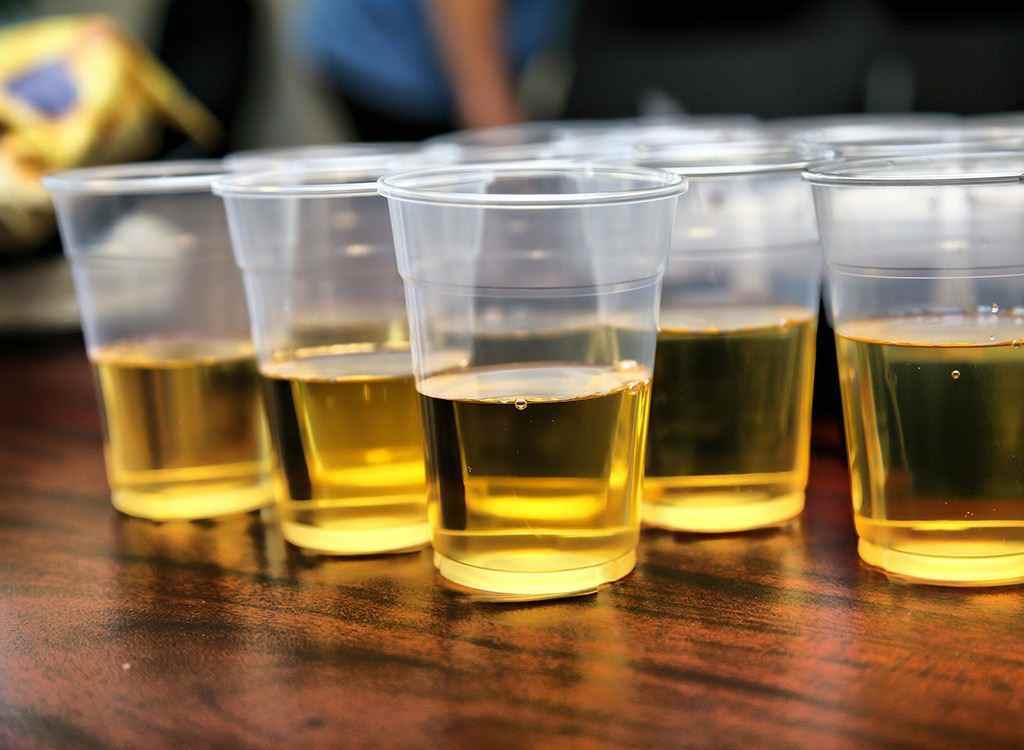
Sorry, stout fans, but beer is off limits, too. “With beer, the amount of alcohol may not be as high as with a martini or wine, but it’s still enough to dehydrate the body, cause muscle cramping in the middle of the night, and disrupt your sleep cycle,” says intuitive nutrition coach Joanna K Chodorowska NC, TPTH, METS, CSG. Beyond that, “beer drinkers also tend to have to get up every 2 to 3 hours after going to bed to go to the bathroom due to the excess of liquids consumed after dinner.”
If you like the idea of an earthy nightcap, try kombucha. Pour it in Thistle glass and your buddies won’t even know it’s non-alcohol.
Coffee & Soda
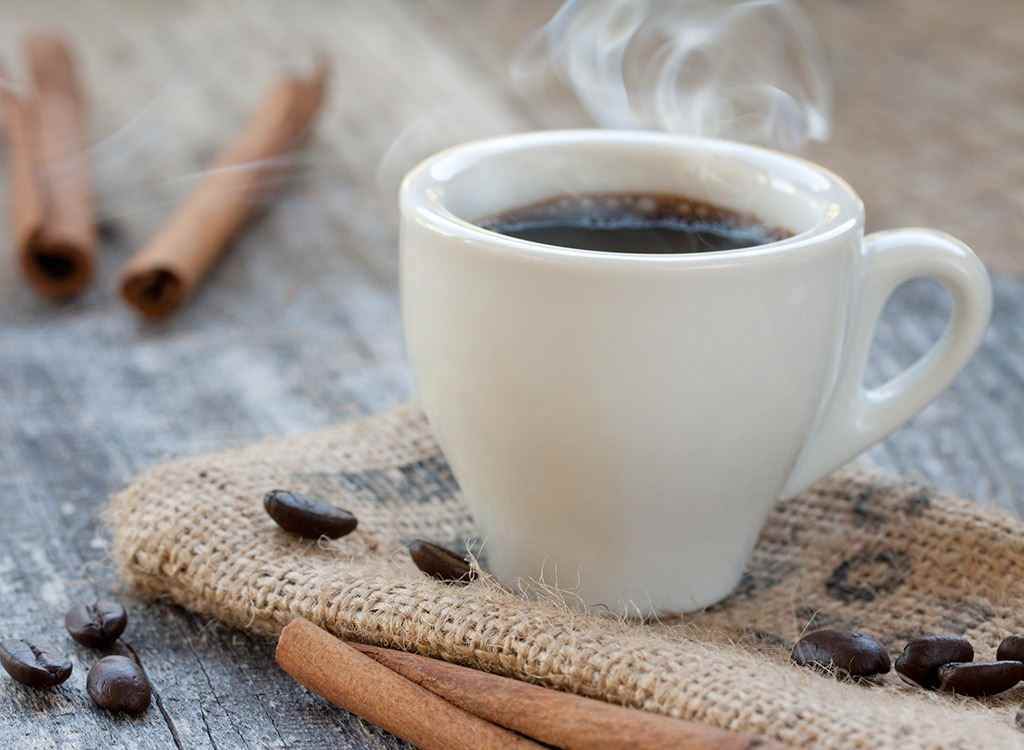
We hope you’d know this one by now! But in case you need a little background info: “Caffeine can stimulate the central nervous system several hours after consuming it,” say The Nutrition Twins, Lyssie Lakatos, RDN, CDN, CFT and Tammy Lakatos Shames, RDN, CDN, CFT. “If you’re at all sensitive to it, you will probably lie awake.” Caffeine’s stimulating effects can last anywhere from 8 to 14 hours, so make sure to keep your sleep in mind when you’re thinking about the timing of that cuppa joe or afternoon diet soda. We’d recommend laying off around 8 hours before you’re planning to hit the hay.
Chocolate
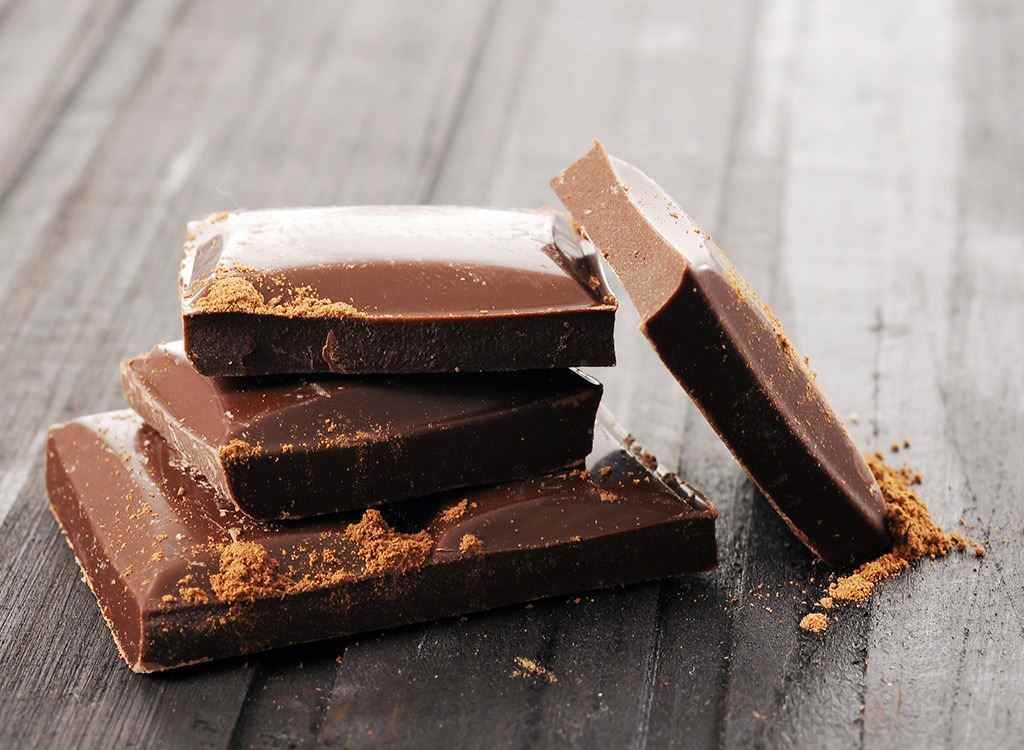
Sorry to be the bearer of bad news, but that chocolate treat after dinner isn’t doing your REM any favors. Like coffee, dark chocolate also contains caffeine, which can increase arousal, prevent your body from shutting down, and decrease your ability to develop and sustain deeper stages of sleep. Chocolate bars have varying amounts of caffeine, but an average 2-ounce, 70 percent dark chocolate bar contains around 79 milligrams—over half of what’s in an 8-ounce cup of coffee. If you know you’re sensitive to caffeine, but don’t want to ditch the dark chocolate completely, try savoring your sweet treat earlier on in the night or cutting down on portions.
Fatty foods
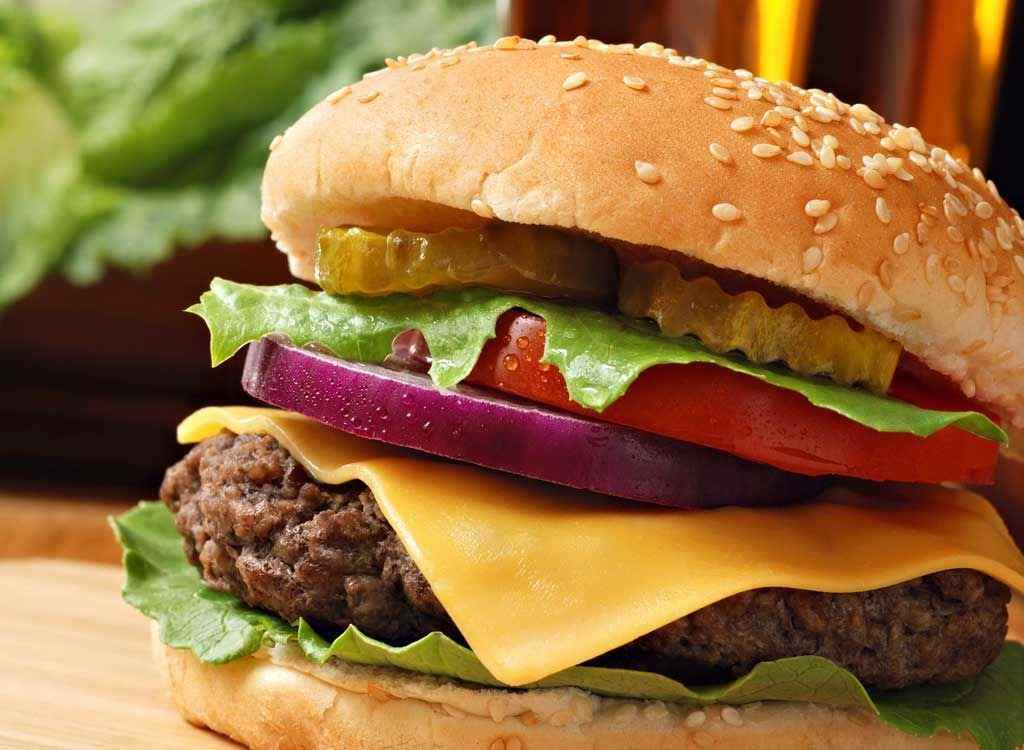
We’re talking about the usual suspects here, like burgers, loaded burritos, and pizza. (Yup, you’ll have to say bye-bye to that side of sweet potato fries or nachos before bed, too!). “These high-fat foods take longer to digest,” offer The Nutrition Twins, which they explain will keep your body up working rather than relaxing. Fatty foods “often cause bloating and indigestion that interferes with a sound night’s rest,” they continue. This leads to more fragmented sleep, so you wake up the next morning without feeling refreshed.
High-sugar cereals
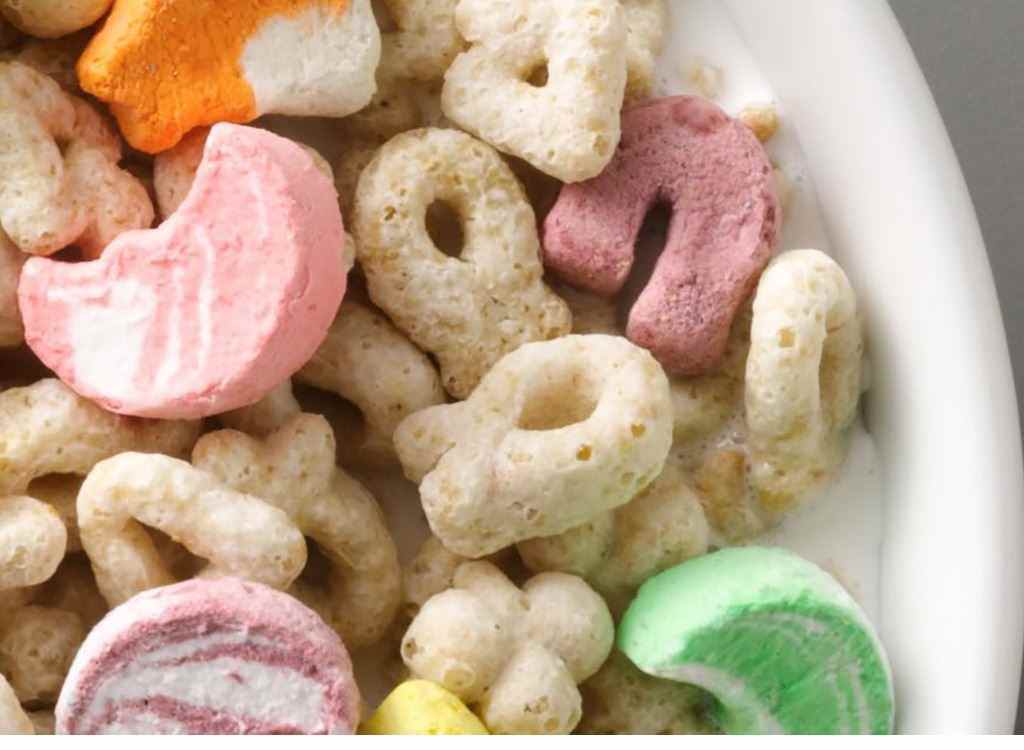
Pass up the Froot Loops, please. “Eating high-sugar cereals will make your blood sugar spike and crash, which will affect your sleep,” says nutritionist Lisa DeFazio, MS, RDN. She continues, “choose a cereal with less than five grams of sugar per serving.”
Hot peppers & spicy foods
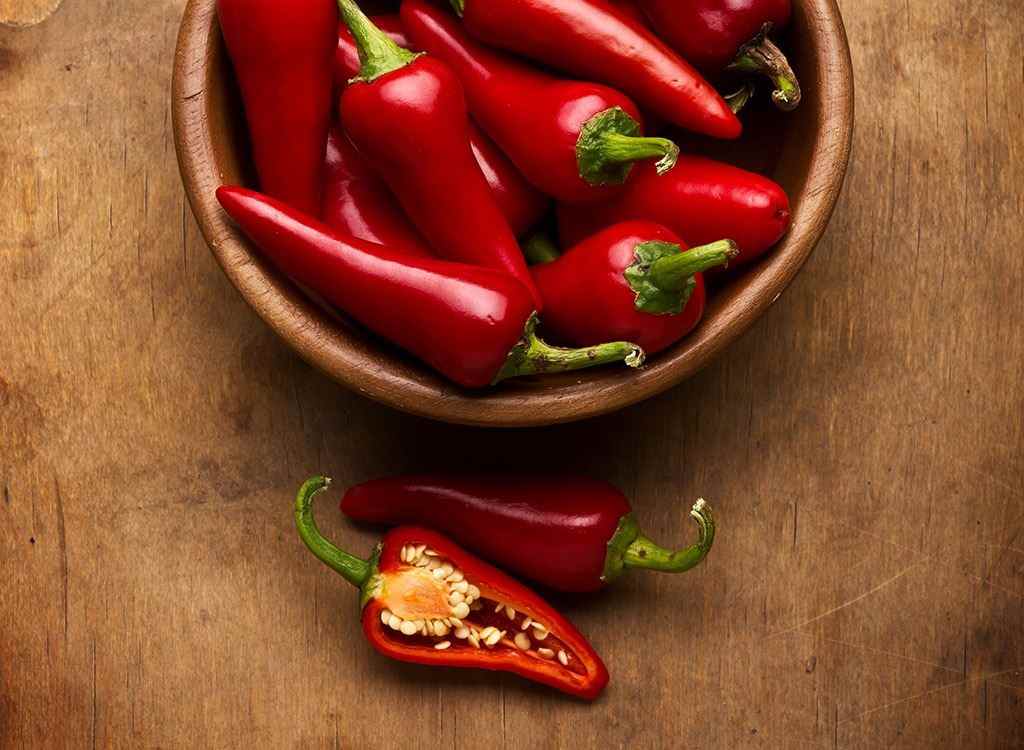
Spicy foods are a go-to when it comes to revving up your metabolism, but they’re also ruining your chances of falling asleep. Spices like cayenne and Tabasco get their metabolism-boosting properties from capsaicin, which can trigger heartburn in sensitive individuals. Erin Palinski-Wade, RD, CDE, explains this compound gets your blood flowing as well, “Its thermogenic properties can increase the body’s core temperature.” Since your core temperature naturally decreases as you get ready to sleep, raising it can cause you to feel more awake and struggle with staying asleep.
A high-protein or high-fat dinner
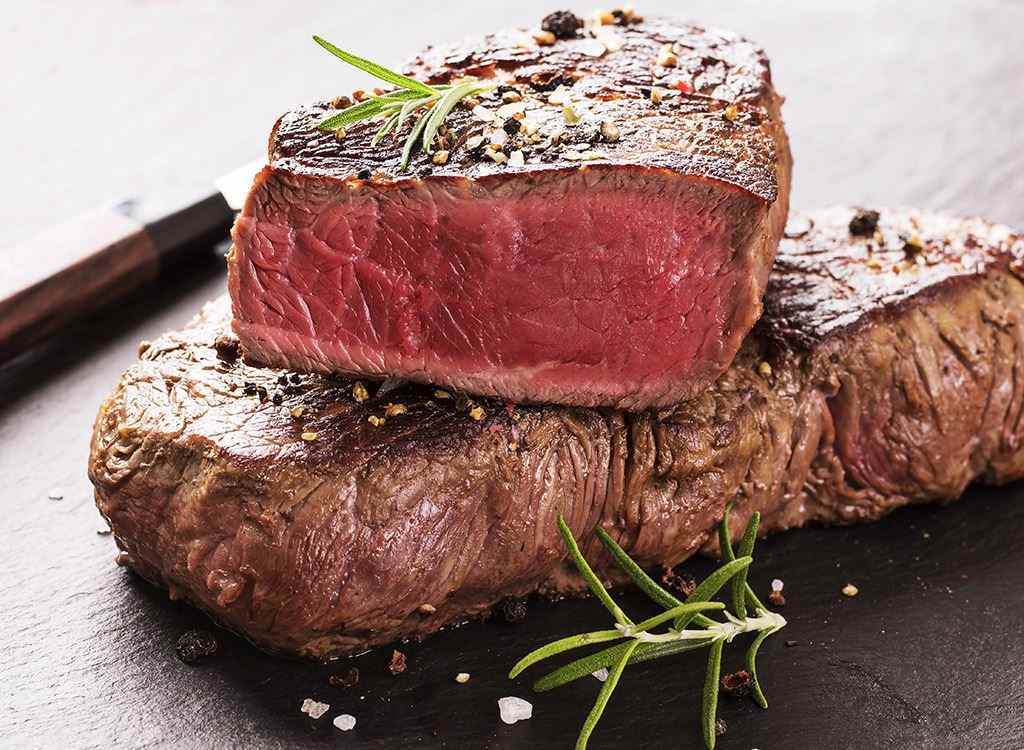
A little lesson in logic: “You may think a high-protein or high-fat dinner will keep you full all night, preventing you from waking. But research shows that eating a high-protein meal before bed can lead to sleep disturbances,” explains Palinski-Wade. Experts believe it’s because a protein-rich meal contributes less tryptophan—the amino acid which is a precursor to the calming hormone serotonin—than it does other amino acids. A lower tryptophan to other large amino acids ratio actually reduces serotonin. And, like many other foods on this list, you may wind up with indigestion or acid reflux since you’ll be lying down with a full stomach.
Dried fruit
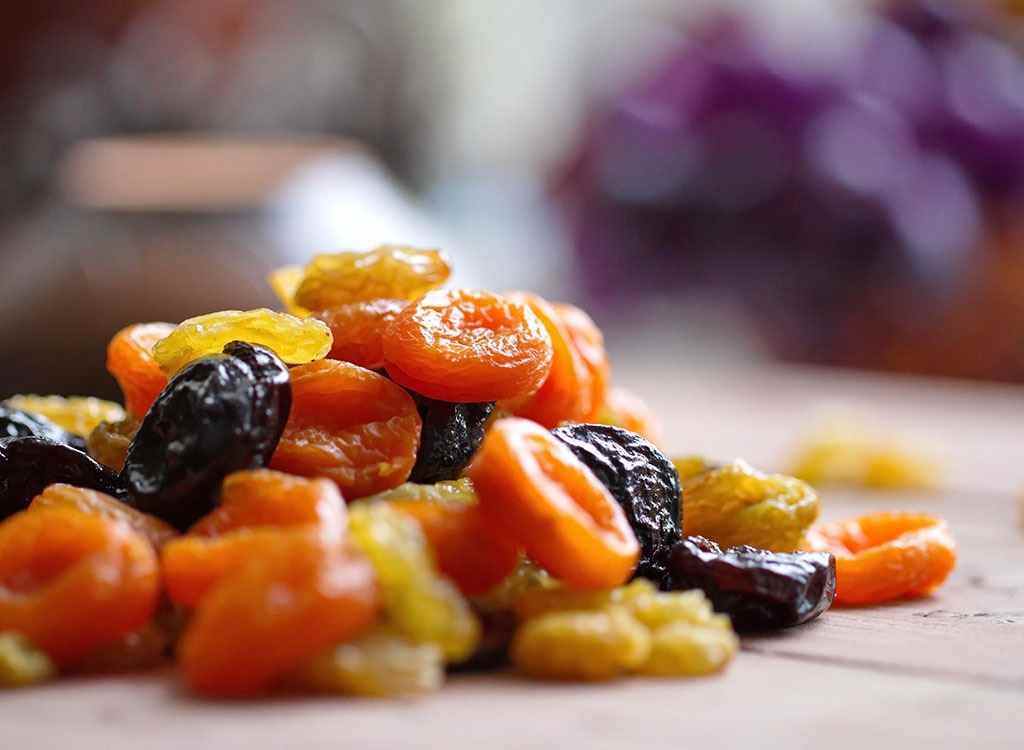
Consuming too much of a high-fiber food like dried fruit can bother your stomach and cause you to have gas and cramps during the night, according to DeFazio. “This is thanks to their high-fiber, low-water content.” Come morning, don’t eat ’em, either. They’re one of the top foods nutritionists wish you would stop adding to your oats.
Water
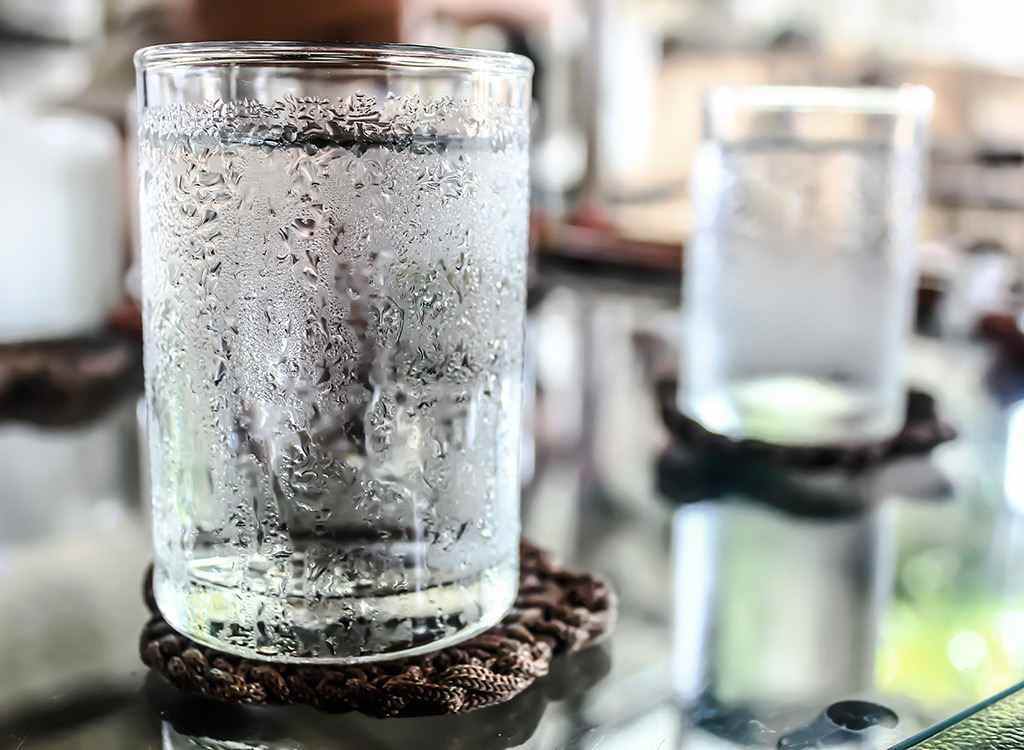
You might want to rethink having that tall glass of H2O on your bedside table—unless you’re saving it for the morning. “Yes, you should drink plenty of water during the day to stay hydrated. In fact, even slight dehydration can significantly drain your energy levels,” offers Palinski-Wade. “But if you drink too much right before bed, you may find yourself awakening multiple times to urinate. Instead, start to taper off your fluid intake about three hours before bedtime.” To chug more water during the day and help aid your weight loss efforts, try one of these delicious detox waters!
Pizza
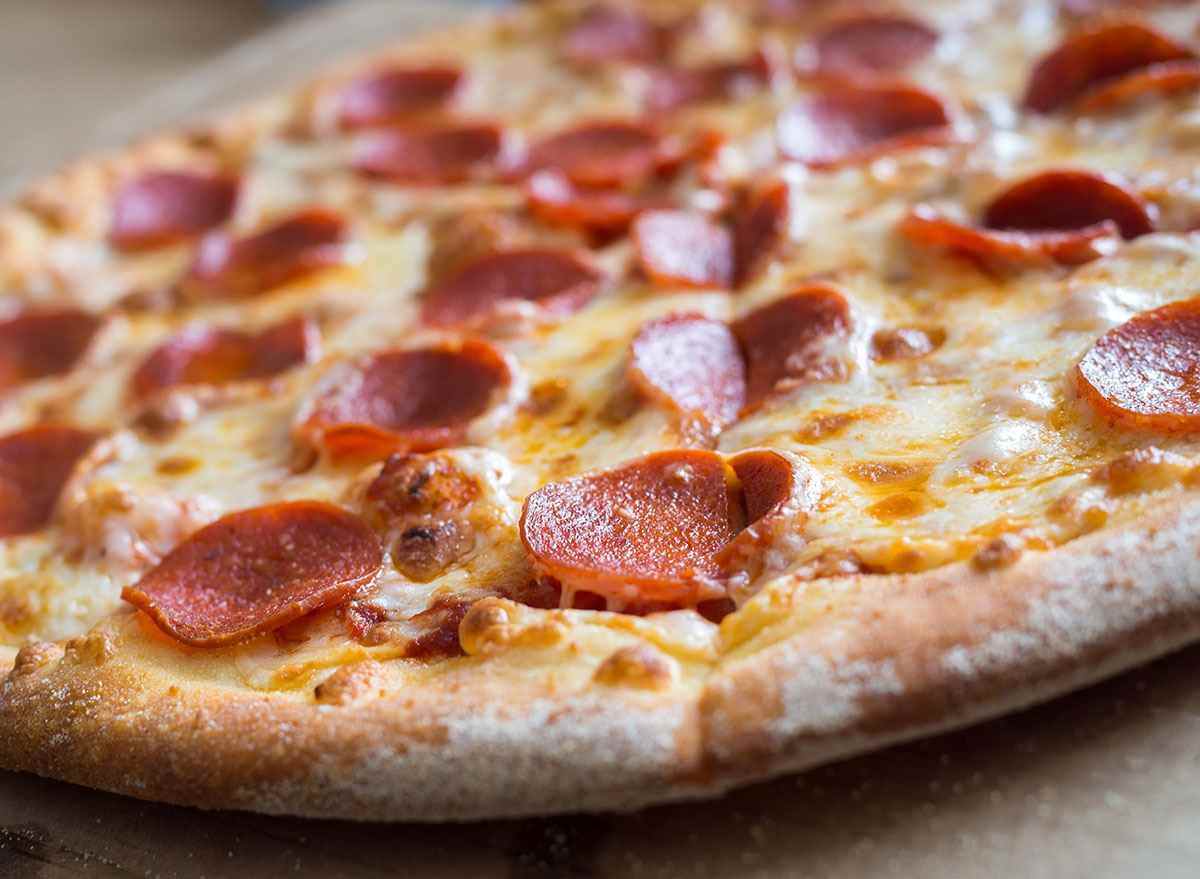
A slice of pizza might satisfy your late-night cravings, but it’ll leave you worse off in the A.M. “The combination of fat in the cheese and the acid in the tomato sauce can have a negative impact on your sleep quality,” says Palinski-Wade. “High-acid foods can trigger acid reflux, especially when eaten close to bedtime. Even if you don’t feel ‘heartburn,’ this reflux can cause you to awaken partially from sleep and leave you tired the next day.”
Peppermint
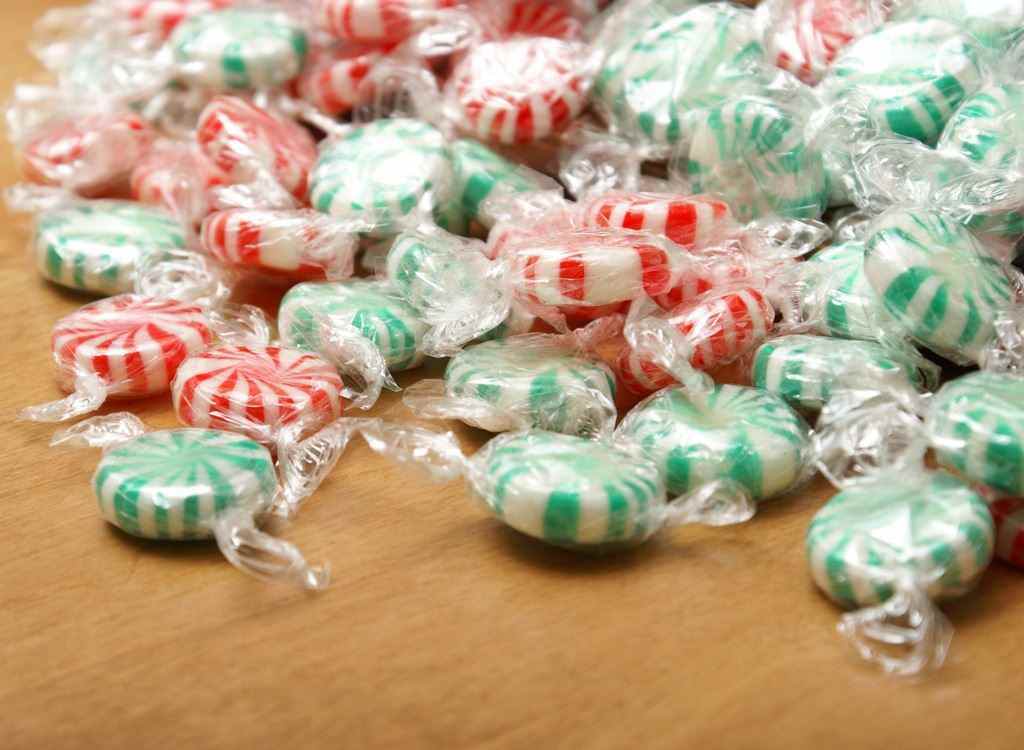
Leave those apres-dinner mints on the check and head home! There are plenty of health benefits of mint, but sleeping well isn’t one of them. “Many people pop peppermints into their mouths after dinner to freshen their breath,” says Hayim. “Some people have it in their tea thinking it will soothe them. But, as it turns out, peppermint is a heartburn trigger. So, definitely stay away from it before bed!”
Green Tea
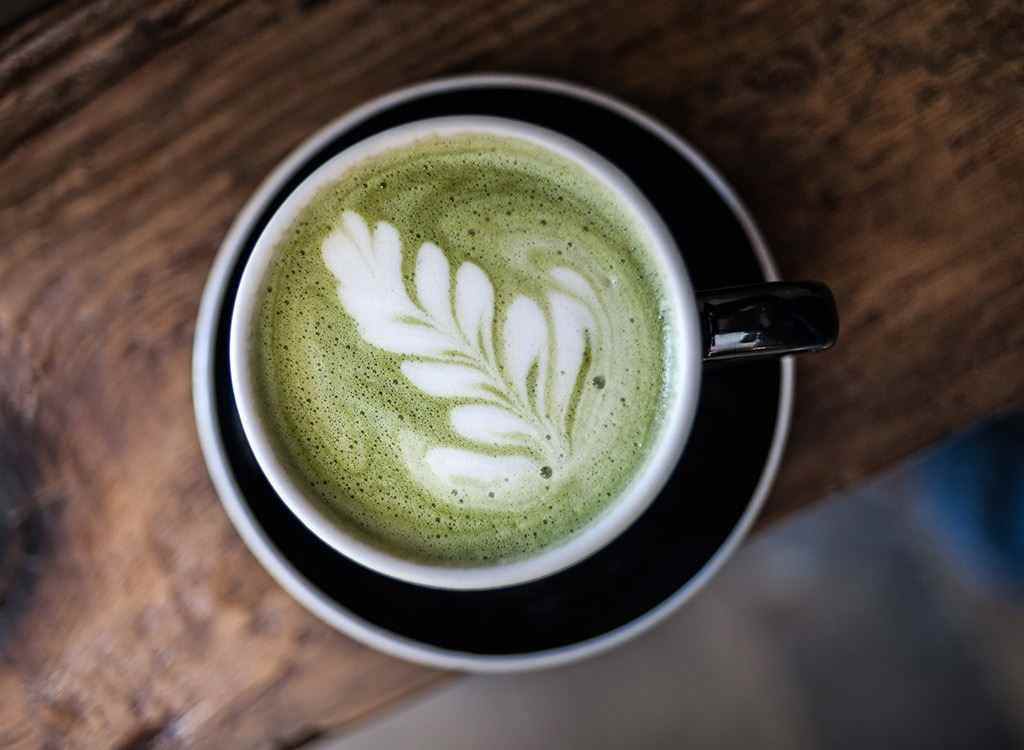
We are huge fans of fat-incinerating green tea, but make sure to taper off several hours before bedtime, at the least. On top of caffeine, green tea contains two other stimulants, called theobromine and theophylline, which Hayim tells us may cause increased heart rate, feelings of nervousness, and overall anxiety.
Fries with ketchup
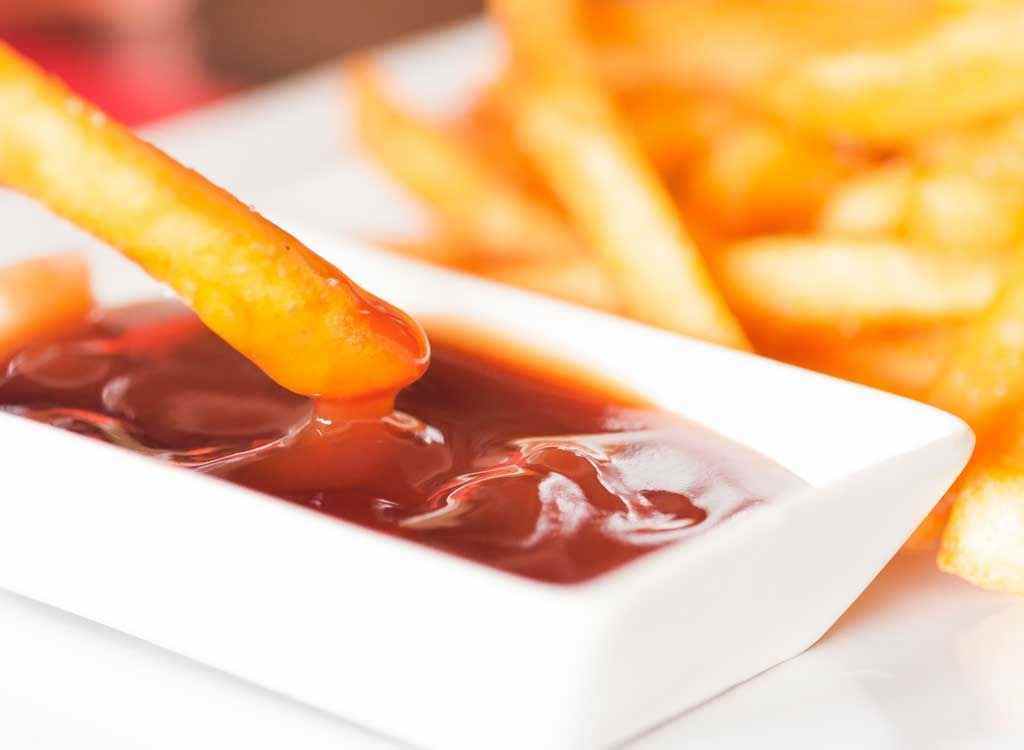
This fast-food combo serves up a double whammy when it comes to disrupting those sweet dreams. Fries are greasy, which is a sign that they’re high in fat, and will keep you up as your body tries to digest them. Dipping them in ketchup is asking for more trouble. “Ketchup is extremely acidic thanks to the tomatoes it’s made with,” offers Hayim. “In addition to the acid that is naturally there, ketchup is usually preserved with other chemicals that make them even more acidic and may lead to heartburn.” Watch out for tomato sauce, too: “Pasta and marinara sauces can contribute to indigestion and heartburn,” The Nutrition Twins say. “This is especially important if you’re prone to indigestion. When you lie down to go to bed, digestion slows, and the horizontal position can make heartburn and indigestion even worse.”
Raw onions
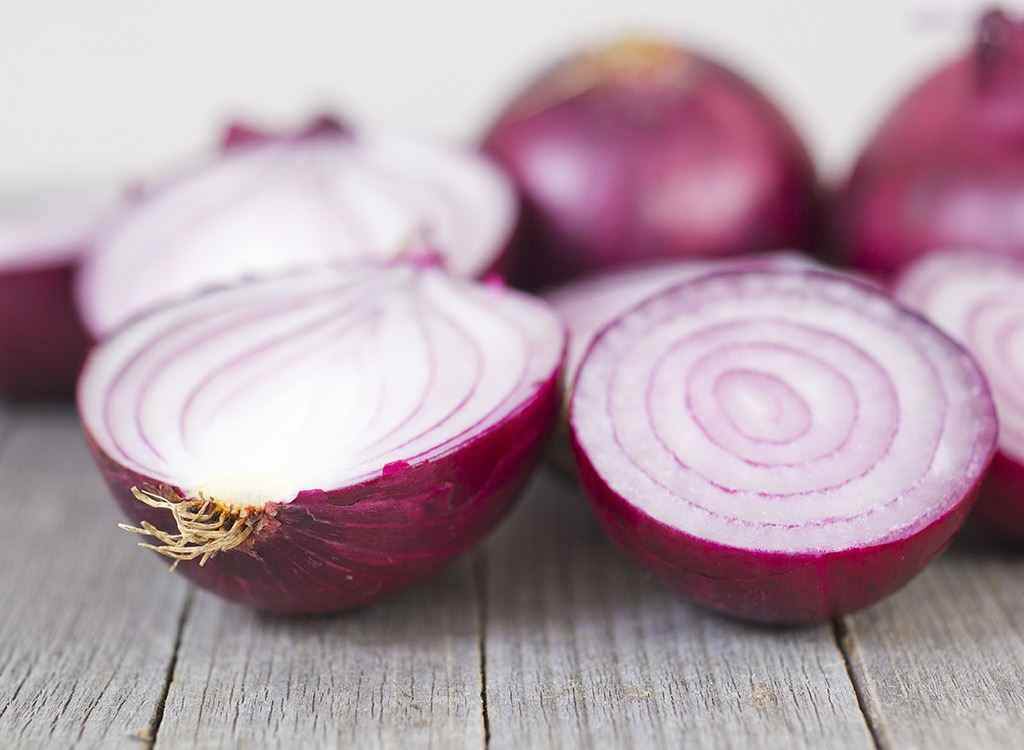
Being able to kiss someone goodnight isn’t the only reason to give up these guys right before bedtime. “Onions can cause gas that affects the pressure in your stomach,” says Hayim, which can result in acid to enter back into your throat—not a pleasant feeling when you’re trying to catch some ZZZ’s. She explains, “Studies have found that raw onions can cause potent and long-lasting feelings of reflux in people who already have heartburn.” Now that’s something to toss and turn over. So even if you’re eating healthy on those late nights at the office, be sure to nix these from your salad.
Too much food
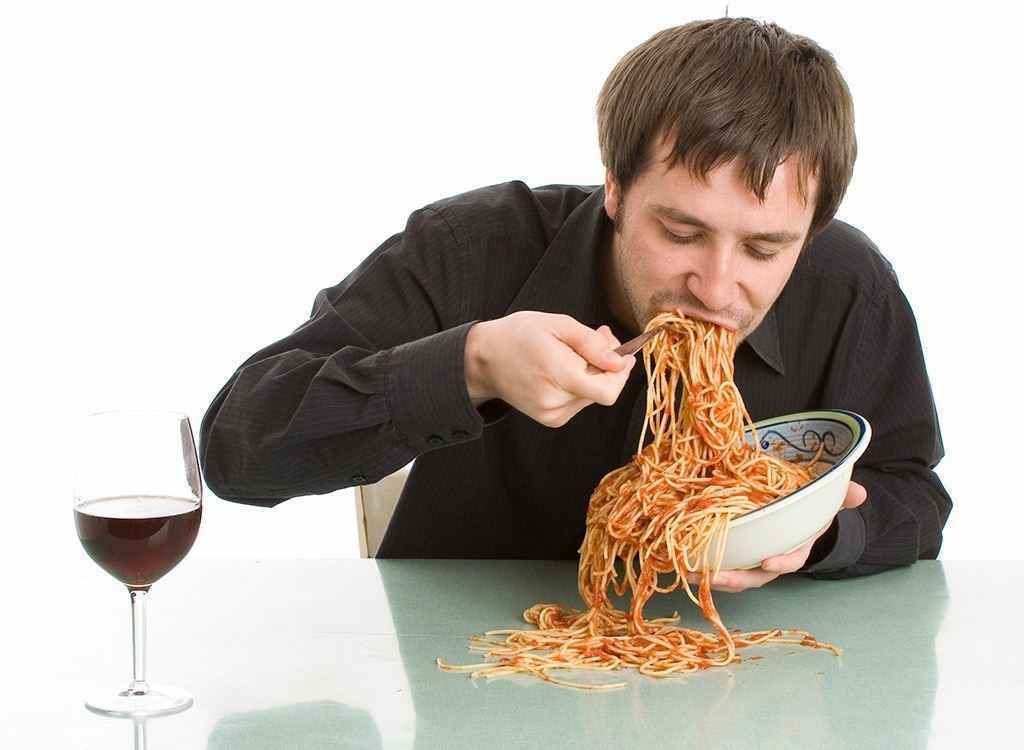
While you shouldn’t go to bed starving (that presents its own body-busting problems, like depleting your lean muscle storage), you also shouldn’t hit the sack completely stuffed. When you eat a large meal before bed, your body is working to digest it long into the night—and if your body is still worked up, so are you. The later you fall asleep, the less rest you’ll get, and you’ll wake up feeling groggy and more likely to reach for calorie-dense items.
Additional reporting by Gabrielle Kassel.
The post 40 Best and Worst Foods to Eat Before Sleep appeared first on Eat This Not That.
